#Animal Fictions Vs Animal Facts
Explore tagged Tumblr posts
Text


A new Animal Fictions vs Animal Facts, just in time for Halloween!
Did you hear this myth growing up? Which type of animal was your “daddy longlegs”?
#Animal Fictions Vs Animal Facts#infograph#dispelling myths#Daddy Longlegs#Daddy Long Legs#Grandaddy Longlegs#Harvestman#Opiliones#Cellar Spider#Pholcidae#spiders#arachnids#crane fly#fly#insect#arthropods#invertebrates#zoology
276 notes
·
View notes
Text



One of two new series I’m introducing for my Instagram account SaritaZoo: Animal Fictions vs Animal Facts.
These will be short infographs intended to clear up some common misunderstandings about certain animals!
Follow SaritaZoo on Instagram for the next posts in the series, covering Electric Eels, Blobfish, Daddy Longlegs, and more!
Btw: I originally meant for this to be just one slide, but then while fact-checking I found out about that dang salamander and I absolutely had to include it. That thing blew my mind. The article I referenced is literally titled “Salamander with a ballistic tongue.”
Diagram from said article below the cut:

#my art#SaritaZoo#frogs#salamanders#Supramonte Cave Salamander#Animal Fictions vs Animal Facts#amphibians#chameleons
394 notes
·
View notes
Text
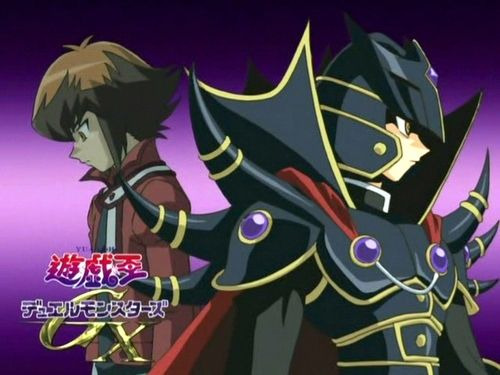

The Supreme King Judai vs. Dark Deku: How To Do a Dark Deconstruction of your Shonen Hero!
Think of this as less me complaining about My Hero Academia, and more me taking a closer look at the writing of the Dark Deku arc and why it failed to achieve what it set out to achieve.
I like to look at writing on a deeper level than Thing Bad, and Thing Good. Imagine a story is a car engine that won't start, in order to find the problem you've got to disassemble all the pieces and look at them one by one to see what pieces aren't working. That's the kind of criticism I'm talking about, break storytelling down into different tools like parts of an engine, plot, world, characterization, ideas, actions and consequences and then look if the author is using those tools effectively to sell a story.
In other words we're talking about the difference in ideas and execution. All works of fiction have ideas, even bad anime can have good ideas inside of it. The idea in question is Judai's case is can exploring the dark side of a hero. Can a hero's positive qualities also lead them down a dark path? Yu-Gi-Oh Gx answers this in a satisfying way, and My Hero Academia I'm going to argue does not.
IDEAS VS EXECUTION
One piece of writing advice I heard from Brandon Sanderson of all people that always stuck with me is "Ideas are cheap. You can always come up with more ideas."
All works of fiction have ideas and themes no matter what the Game of Thrones guy say, but some works are better at communicating their ideas than others. I want to quote a Homestuck Ending analysis of all things to explain what I'm talking about.
When you are a writer you can write anything you want. But if you want to write a story that people want to read you have to follow the rules of good storytelling. There are reasons why storytelling rules exist. A story is a bond between author and reader, readers to other readers. It is a communication between humans and humans work in a certain way. Storytelling rules are rules of communication. Rules for handling expectations and saying what you intend to say without it being misheard. Rules for tugging at emotions and pulling heartstrings in a good way rather than a bad way. Storytelling rules are lessons learned by authors of the past that failed to communicate what they needed to. They are not that subjective.
Chief among these rules is buildup and payoff. In fact one of the most basic techniques of storytelling is foreshadowing, in screenplays you usually foreshadow one important twist, then add a reminder so the audience doesn't forget, before finally paying it off.
To simplify build up and pay off I like to refer to it as question and answer. Usually a story will ask its audience a question, and usually by the end that question is answered, unless the point is to leave that question unanswered / ambiguous.
Character arcs are examples of buildup and payoff too, a lot of characters, especially in serialized media are sold on their potential future development. Here's an example, how may people got invested in Dabi years in advance because of the Dabi is a Todoroki Theory? That's an example of good buildup and payoff, because the author sewed just enough hints to build up an audience expectation and then paid it off. People became invested in the story, because they thought their investment and theories would pay off eventually and it did - so hooray!
Both MHA and YGOGX dedicate an entire arc to trying to deconstruct their main protagonist. They also seek to deconstruct the "Hero Complex" or "Saving People Complex" that each protagonist has, and ask the question if those traits are really a good thing.
This post puts it better than me so I'm going to quote tumblr user rhodanum.
‘Hero complex’ or 'saving people complex’ — an obsession with rescuing people in the face of danger, often to the exclusion of all higher thought processes. All too prevalent among shounen main leads, especially hot-blooded shounen main leads. Yuki Judai is certainly no exception. What is interesting in his case is that the writers follow the consequences of his rash, reckless, often thoughtless actions all the way to their heartbreaking logical conclusion. For those not fully in the know, it involves spiky black armor, an army of sycophants and a fall from grace that caused as much damage as a thermonuclear bomb. Don’t make perky, happy shounen protagonists snap, people. First rule.
I'm going to quote another video too, to add onto the above quote. It's from this video, starting at around 39:52
"GX is kind of famous among fans for taking its happy protagonist and stripping him down to all of his worst qualities. And that's fun. So Judai is a character who's really interesting. He's definitely open to a lot of interpretation, and you know we're gonna be leaning on my interpretation of him. Sorry. It's my video. I think he's commonly referred to a "very typical shonen protag" probably one of the most shonen protag of the yu gi oh protagonists. He is headstrong and loud, and (makes punching noises while air boxing), he is a type of character who's like I'm gonna be the best and brings everyone along on the ride. He's the kind of protagonist that everybody loves him they're all fighting over him, and Yu Gi Oh Gx really puts him up on the pedestal, of like THIS GUY. THIS GUY DOES IT ALL. Then season 3 rolls around and dares to ask: but what if that's selfish behavior?"
That's the question both MHA and YGOGX are asking in Dark Deku arc and Season 3 respectively, what if all of those behaviors that make them the typical hot blooded shonen protagonist are actually selfish? Is their hero complex really a good thing?
Each arc is tasked with exploiting the main character's flaws, until they reach their emotional breaking point and lowest point in the story. Let's see how each story treats their main character and from comparing that I want to make a point about what makes effective storytelling.
The Supreme King Haou Arc
Instead of recapping the entire arc to you, I'm going to touch upon what ideas the story setup in regards to Judai's character and how it paid off those ideas. What are the questions the story asks and what answers does it give us?
I'm going to focus on the two questions I outlined above. Is their hero complex a good thing? and What if this is selfish behavior?
Yu-Gi-Oh GX is an anime where instead of using super powers, the main characters fight each other with a magical trading card game. Besides that fact there's a lot of similarities between GX and MHA. They both take place in an academy setting where the main characters learn about using their quirks, and playing the card game better respectively. It is a shonen battle anime where almost everything is solved with a shonen fight, they just use cards instead of flashy superpowers. The main characters are all students who have to grow up and enter the adult world.
Judai and Deku are both characters that deconstruct the "hero complex" of shonen main characters. Judai is themed entirely around heroes, he has an elemental hero deck where every hero is based off a hero that appears in popular culture, he is the best duelist in the school and the one everyone calls on to save the day over and over again. As stated above he is the most Shonen Protag to ever Shonen Protag, he's a warrior therapist who makes friends and saves the day because he's really good at the card game, and will always show up to fight for his friends.
For the first two seasons Judai is built up on this pedestal of the ideal Shonen Protagonist, and praised by basically every single character for being "childish" and "pure of heart" however when Season 3 comes around the narrative stops heaping endless praise on him and starts to challenge him. However, this doesn't come from nowhere there are signs of these personality flaws of Judai, they just get swept under the rug the first two seasons.
There are several moments such as the climaxes to season 1 and season 2 where Judai fails to grasp the stakes of the situation, saying things like "Oh, this card game is really fun" when he's dueling with lives on the line. Judai in fact has a pattern of "only wanting to duel for fun", he fights because it's fun to him not because it's the right thing to do. However, he's continually forced into high stakes situation where he has to fight for others just because he's the strongest character - and constantly having to carry that on his shoulders starts to weigh on him after awhile. Judai will show up to fight and save his friends every single time they need him, and that's the source of his hero complex because after a certain point his friends start relying on him too much.
In general he also doesn't have deep thoughts of what heroes are, he admires heroes but it basically boils down do "Heroes are cool." He's kind of like Goku where he doesn't really fight for any idea of justice or to save others, just for the thrill of fighting itself. He also has a tendency to be insensitive to other people's feelings and take things for granted. For example, in Season 2 like three of his friends get possessed and Judai doesn't even do anything about it for half a season because he's too busy participating in the dueling tournament.
In general though it's a pattern of Judai only wanting to "duel for fun" and him being forced to duel to save others instead, and be responsible for other people. Judai will show up to fight for his friends, but even then he falls back on just "dueling for fun" because always having to fight for others is too much responsibility to put on his shoulders.
There's a lot of hints of Judai's flaws, but they also tend to get brushed off because shonen protagonists are just like that. Like, Judai can say some insensitive things to his friends sometimes and be oblivious to their feelings, well he's just a book dumb shonen protagonist. Judai should be taking this fight seriously, well he's just being a happy go lucky shonen protagonist, etc. etc. A lot of these things are also just swept under the rug as him just being a child, a boy-at-heart like most shonen protagonists are supposed to be.
However, season 3 starts looking at Judai not as a shonen protagonist but as a person, and it all starts with the suggestion that maybe Judai remaining a child at heart is a bad thing, especially when his friends around him are all growing up. It all starts with the introduction of this guy right here - Johan Anderson.
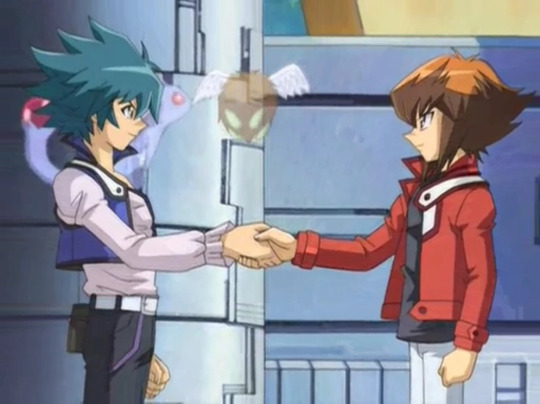
Johan shares many things in common with Judai, he can see spirits, he's a duelist who loves to duel, he has a strong connection with his cards. However, the more you compare them the more you notice that Johan has a lot of things that Judai lacks. They are so similiar that they become almost instant best friends, but even then Johan himself notices there are a few things off about Judai's behavior.
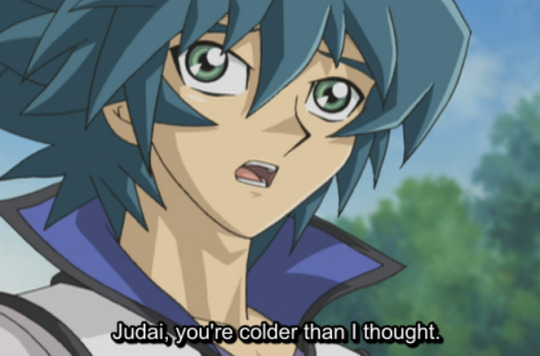
Sho: Bro... I thought you would have something to say to me. Johan: He seems lost. I think he just wanted you to give him some advice. Judai: SHo will be fine. Johan: Judai, you're colder than I thought.
It takes someone completely new to the dynamic between Judai and his friends, who likes Judai but hasn't spent the past two seasons idolizing him to realize that some of his behaviors are kind of off. That Judai isn't really the most empathic, or even that good at understanding other's feelings.
Johan is the one to point this out because he has the emotional intelligence that Judai lacks. We've been told Judai is our shonen protagonist for two seasons, only for the real shonen protag Johan to step up out of nowhere and show them how it's done. Johan is good at seeing other people's emotions, and he becomes a near instant pillar of emotional support for Judai. More than that, he also is the first person to treat Judai like an equal, he never asks Judai to save him like all of Judai's friends do, if anything they both save each other.
Johan also exists to show what Judai is lacking, mainly a reason behind why he fights.

Judai: I do it because it's fun. Or because of the surprise and delight, I guess. Well, I guess that comes down to "because it's fun", huh? Sorry, I guess that's an awkward question to ask out of nowhere. Johan: What's wrong, Juadi? Judai: Nothing, really. Johan: I have a proper goal. Judai: Don't tell anyone. Even if people don't have the power to see spirits, they can still commune with them. That's why, for those people as well... (I want to be a bridge between humans and spirits).
Judai is someone who will always show up to save his friends when he is asked, but he doesn't really have a concept of what being a hero is or the repsonsibilities it entails, he just admires heroes in a pure hearted way. Johan on the other hand has a reason to fight and that's to help humans and card spirits get along, and Judai expresses admiration for Johan because he has a goal.
At the same time this is happening, Judai gets picked apart by two villains for his lack of reason for fighting. Judai has been praised to death for two seasons for being pure of heart, but now the villains are challenging him by saying he has no "darkness of the heart". That without it the reasons that Judai fights are superficial and frivolous.
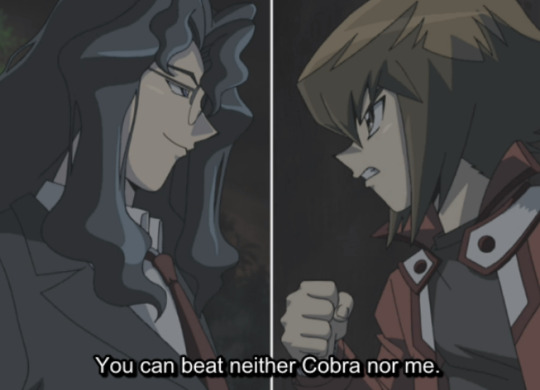
We have something that you lack. Judai: That I lack? Yes the darkness of the heart that slumbers deep within a duelist. The burden that a duelist bears in his heart. Judai, you have none of that. Judai: A burden in my heart. I have nver, not even once, dueled for myself. I doubt someone like you, who only thinks of himself could udnerstand that. Judai: What would be fun about a duel like that? It isn't fun at all! You must bear other's expectations while remaining strong. That is what it means.
Judai is a bit of a blood knight, he will be dueling with his friends lives on the lines and stop to go "Wow, this duel is really fun" and it's usually just dismissed a shim being a shonen protagonist until suddenly it isn't.
I'm gonna draw a deliberate parallel between Deku and Judai here that I'll reference later on, they both don't understand "darkness of the heart" and they need to understand it in order to grow as people.
There's also the underlying notion that being a hero is not all it's chalked up to be, to be a hero, to fight for other people's sake means also taking on their suffering. As noble as that may seem suffering is suffering.

Cobra: Fortune would never smile on a fool like you who fights while prattling on about enjoying duels. Cobra: You are certainly a talented duelist. But you have one fatal flaw. Judai: A fatal flaw? Cobra: Yes, your duels are superficial. Someone who fights with nothing on his shoulders, cannot recover once he loses his enjoyment. What a duelist carries on his shoulders will become the power that supports him when he's up against the wall! Cobra: But you have nothing like that! Those who go through life without anything like that cannot possibly seize victory. Cobra: But I know that nothing I say will resonate with you... because you have nothing to lose but the match. Judai: I... Cobra: Afraid aren't you? Right now, you have nothing to support you.
In the context of this scene, Cobra has told everyone that he's currently enacting his evil plan out of the vain hope that he can somehow revive his son from the dead.
As insane as "I think I can revive the dead" is as a motivation, fighting for the sake of your dead son is a much stronger motivation than "I think duels are fun."
Judai doesn't have an appropriate answer as to why he fights when he's questioned by the villains, and instead of coming up with his own answer he relies on the answer Johan provided for him.
Johan: You idiot. Why are you so shaken Judai? You think you have nothing on your shoulders? Give me a break! You always bear other's expectations on your shoulders. When you have other people's expectations riding on you, it means they've trusted you with their hopes! Don't you always carry those? If you lose what will happen to us here?
Johan's words snap him out of it, but this isn't Judai coming up with an answer himself it's just taking the one that's provided for him.
This is also the point where we get start to develop an answer to our question. Is Judai selfish?
In action he's not. His actions are selfless. Judai is always fighting for others, even when he only wants to duel for fun. He will show up and fight if you ask him too.
However, in motivation he is selfish. His motivations are selfish. Judai isn't fighting out of some selflessness, but because fighting for the sake of other people gives him a purpose. He keeps fighting for his friends, because he's built all of his friendships around being the one to solve their problems. It's why he Johan's answer suits Judai so well, because he thinks that's how friendship works that he has to keep carrying everyone's burden for them.
Not only does it lead to unhealthy friendships (he sees his friends as burdens) but also it's unhealthy for Judai himself (he can't keep carrying other people's burdens without getting weighed down).
Judai's hero complex, this pressure he feels to save everyone around him arises from two things, it gives him friends when he'd been a lonely child before that, and it gives him purpose. Playing the hero is how he made all of his friends, and now it's how he keeps them.
However, in spite of doing all this to keep his friends, Judai's relationship with his friends is so all give and no take that he's practically fighting alone until Johan shows up. Judai doesn't form a healthy and stable relationship with Johan however, Johan just becomes a crutch.
In Summary:
Judai's actions are selfless.
His motivations are selfish.
Judai's purpose is to carry everyone's burdens on his shoulders.
Judai's friends exist to be saved by him.
The following arc is roughly divided into four sections. Everything I've covered above happens in the first section the Cobra Arc.
Cobra Arc
Zombie Survival Arc
Dark World / Supreme King Arc
Oh Shit, Yubel's Back
The cobra arc is the introduction and it sets up the basic ideas of Judai's character that I listed above, in addition it focuses on the question of if Judai is selfish, and the idea that being a hero is a burden. There's also the third question where Judai is called to understand darkness of the heart, something Deku will also be called to do.
The Zombie Survival arc is an arc where the school is teleported to another dimension and they have to survive for several days with a limited food supply, everyone fighting, and an outbreak of zombies.
The main setup of this arc is to show how everyone is working well together as a team, even in a high stress situation. Alexis, Judai, Misawa, Kenzan, all pull together with the help of new students Johan, Austin O'Brien and Jim Crocodile Cook.
However, I'm brushing over this arc because Judai doesn't actually do much this arc. If you analyze who does what, it's mainly Johan and Austin O'Brien who are in charge of the entire school. Johan demonstrates leadership skills, calls on everyone to pull together in a time of crisis, and most importantly emotionally supports Judai all throughout.
Even when Judai is confronting the main villain of this scenario Yubel, it's Johan who shows up to support Judai, and it's Johan who wins the duel at the sacrifice of his own life. Everyone gets through the zombie arc unscathed, but it's because Johan is the hero of this part of the arc, not because of anything Judai really did.
Judai who having gone on so long carrying other people's burdens to the point where he's made saving others his purpose, has for the first time experienced someone helping him carry those burdens only to disappear and Judai does not react well to it.
This is when the story has finished setting up all the dominoes that are about to fall. We have one mini-arc drawing attention to the dark side of Judai's personality and how he doesn't understand his own darkness, and one mini-arc showing Johan being a much more effective hero and leader than Judai, demonstrating everything Judai lacks.
You Either Die a Hero, or You Live Long Enough...
Yadda yadda you know the rest. A character being undone by the same traits that made them a hero, is classic tragedy 101. It's called the Hamartia or the fatal flaw. A character's greatest strength in some situations can be their greatest weakness in others. The Supreme King Arc is a masterclass in showing how the traits Judai had that led to his success in the first season, can lead to his total ruin, and even to him becoming the villain of his own story.
Hero and Villain are much closer than you'd realize, and this becomes especially true in the relationship between Judai and Yubel. Judai shares an extremely close relationship to his antagonist foil, just like Deku does with Shigaraki.
However, in Judai's case he's the reason that Yubel turned evil. While it's not entirely his fault, Judai's decision to abandon Yubel when he was a child, made Yubel go through ten years of painful torture all alone, which is the reason behind their current madness.
To summarize Yubel and Judai's story briefly. Yubel is a card spirit, the thing that Johan wants to serve as a bridge between card spirits and humans. Judai had an incredibly close relationship with Yubel as a child, but Yubel was overprotective and used their powers to harm anyone who came near Judai. Judai launched Yubel into space hoping the righteous space rays of justice would calm Yubel down (I know that sounds stupid just go with it) but instead Yubel was hit with the light of destruction a corrupting force that made them endure years of torture. They called out for Judai's help in their dreams only for Judai to eventually forget about them with a psychologist's intervention. Eventually the satellite they were trapped in made it's way back to earth, and they almost died burning up on re-entry. When they finally crawled their way back to Judai, they found Judai had been living the past ten years happy and surrounded by friends, while they had been tortured in space and nearly died all alone.
At which point Yubel snaps, hard.
While it's not Judai's fault entirely because he was a child and he didn't know what was going to happen, he still made the decision to abandon Yubel and stuck them in that situation. Judai's actions creaeted Yubel, and now Yubel is here broken and hurt and determined to hurt all of Judai's friends.
Judai doesn't know how to cope with the guilt or responsibility for either of these things. Both for creating Yubel, and for the fact that because of Yubel Johan might now be dead.

I'm the one who made her what she is!
This is where the show starts demonstrating that understand in darkness of the heart is necessary, because Judai can't understand two things, number one the fact he might have hurt Yubel, and two how to deal with the sense of responsibility he feels towards Yubel becoming what they are, and for Johan's apparent death.
He just feels a lot of guilt, and as someone who's only been the carefree hero up until this point he doesn't know how to deal with that guilt.
Judai makes a very similiar decision to Deku. He decides to go out and hunt for Johan by himself, leaving his friends behind so he won't risk their safety. Unlike Deku however, his friends immediately follow and insist on coming along.
This is when the problems start appearing, because the second everyone enters the Dark World to look for Johan, the show starts demonstrating clearly how different Judai's leadership is from Johan.
All of Judai's flaws start popping up, he's tactless, self-centered, and doesn't consider others feelings, and most importantly of all he doesn't look before he leaps. These behaviors that could earlier be swept under the rug, just become aggravated in a high stakes situation where everyone's lives are on the line. Judai came together with everyone to look for Johan, but he keeps acting like he's alone.
Another user's meta post here summarizes Judai's actions in the Different Dimmension, more succinctly so I'm going to quote them.
Shit Judai’s friends signed up for when they went into the Different Dimension with him:
searching for Johan
working as a team
deciding as a group what risks they’re willing to take
risking their lives together, on an even playing field
Shit Judai’s friends didn’t sign up for when they went into the Different Dimension with him:
having their input thoroughly ignored
being left behind while their friend recklessly charged ahead
having essential information kept from them (Judai didn’t tell them about the fatal consequences of dueling in Dark World)
being kept from dueling without their opinion on the matter ever being taken into account
having their physical, mental and emotional well-being be completely ignored by the de-facto group-leader
being relegated to secondary importance in comparison to Johan, in Judai’s eyes
having their group leader outright break the promises he made to them
To name a few things Judai does while in the different dimmension. Almost immediately after entering the dimension he runs away from the rest of the group, forcing Austin O'Brien to follow before anyone has even gotten their bearings or investigated where they are. Make an agreement with everyone to rest and wait for Dawn to search for Johan, only to run off into the middle of the night without telling anyone. Run off ahead of the group leaving several of their members behind, and when O'Brien tells Judai that members of their group are missing and that he should go back and search for them, Judai asks O'Brien to just do it instead.
Judai doesn't see the flaws in this behavior because it's how he's been acting all along, he always runs off into danger head first and he always fights on his own. Judai's never been good at considering the feelings of others though because he's a tad socially impaired, so he just doesn't seem to notice everyone's growing concerns with how he's acting.
Once again we are asked the question, is Judai's behavior selfish?
Judai deliberately abandons his friends three times, and the third time everyone stops to discuss his behavior.
Kenzan: True, we did come to this world to save Johan, saurus... Fubuki: He did find some minor clues as to Johan's whereabouts, so I suppose it's only natural, but... Asuka: But right now, I feel something is different about Judai. Menajoume: That's right. He got us all riled up about this, and now he's totally forgotten the comrades who came along with him. Kenzan: That's really irresponsible, Saurus. Fubuki: I don't mean to be a wet blanket, but I wish he'd realize the anguish he's putting us through. Asuka: Judai isn't doing this for Johan or us now. It's for himself. He just seems to be rushing forward, headlong, to forget the responsibility he bears on his shoulders.
The answer now is yes, his motivation is selfish because it's no longer about saving Johan, but just to stop himself from feeling guilty.
The stress of the situation is aggravating Judai's worst qualities yes, but Judai's always thought about himself first before others, he's always viewed his friends more as burdens / people to be saved rather than equals.
This all leads to a situation where Judai messes up big time. The same way he abandoned Yubel, he abandons the rest of his friends to run ahead and search for Johan.
They are all kidnapped - and it's Austin who notices they are missing Judai isn't even paying attention. Austin says they should head back and look for the others, but Judai asks Austin and Jim to handle that alone so he can keep searching for Johan.
Jim: The others haven't arrived yet. Something might have happned to them on the way. Judai: I see. Sorry, but could you go back and fetch them? Jim: What? You mean you don't care what happens to them? Austin: Don't forget these are the friends that are in this with you. To fulfill our objective in this dimmension we need everyone working together. You wait here until we return. Judai: Okay, I will.
Austin and Jim agree to go back and search for the others, if Judai promises to wait for them here instead of going on ahead. A promise which Judai immediately breaks.
Which is how Judai walks right into a trap.
Judai abandons his friend so they get kidnapped. He doesn't go back to look for them, so he misses out on a chance to save them. He doesn't wait for Austin and Jim to come back, and because of that he wanders all alone into a trap.
That trap is a sacrifice ritual where the leader Brron challenges him to a duel, and every time Judai attacks one of his friends are sacrificed. Judai is forced to attack and each friend dies one by one.
Judai didn't want to attack, he didn't choose to sacrifice his friends, but he did make every decision leading up to that. The trap was easily avoidable if he 1) didn't leave his friends behind 2) went looking for his friends after they were left behind or 3) waited for Jim and Austin to come back.
Judai didn't mean to sacrifice his friends, but it's a result of his own bad decisions. It's the culmination of an arc where he's been selfishly taking his friends for granted. It's a consequence for Judai just choosing to recklessly barrel forward because he can't cope with his guilt.
Judai's lack of darkness of the heart really dooms him here, because he was blind to his own flaws until it was too late. This isn't even the part where Judai does the bad thing, Judai's careless actions lead to four of his friends dying but he doesn't learn from his mistakes. He snaps, hard.
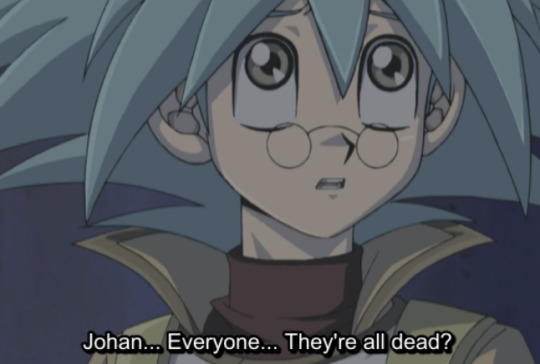
Judai: But at least I avenged them. Sho I'm really glad you're alive. Sho: Those words... they're just lip service. Bro... bro, you're selfish. Before now, I thought of you as the sun. Someone who gave others energy and made the impossible possible. But, I was wrong. All you care about is getting your way. You don't care who you sacrifice. You'll do anything in the name of your goal. Avenging them won't bring back the people you sacrificed. You're just dueling to satisfy yourself. Judai: O'brien! Austin: I thought I told you to wait. Judai: Are you saying what I did was wrong? Austin: Think it over for yourself. Judai: Why? What did I do that was so wrong? I... I did the right thing! And yet... everyone keeps leaving me! What... What is wrong with me? Supreme King: Yuki Judai. To be willing to be evil to defeat evil. This world exemplfiies survival of the fittest. It must be ruled with power. Judai: Power? I don't have that much power... Supreme King: You hold the Super Polymerization card in your hand. Defeat the spirits that stand against you. Breathe their lives into it and complete that card.
After this point Judai decides to sacrifice everything else for power, and to complete the Super Polymerization card he's already sacrificed four friends four.
It's the culmination of an arc where Judai's only been praised for his strength and his ability to win duels. Where he constantly has been called to win duels to solve problems, until that stops working. When everyone is gone, all that's left is his strength. He had to keep winning to keep people safe, but even that wasn't enough, he was still missing something.
He knew he was missing something, that there was something wrong with him and he didn't know where to look.
Conclusion?
He needed power. If he had power, then he wouldn't have lost. If he had power then everything would have turned out alright. He didn't have the strength to carry everyone's burdens for them, that's why he lost, so what he needs is more power. He's been demanded to win, win, and win again so now winning is all that matters.
Now we have our second question: Is Judai's hero complex a good thing?
That's a definite no, because the pressure to always win, to always save everyone and carry their responsibilities has now completely broken Judai. To the point where he now believes that the only thing good about himself is that he's powerful, but he now is willing to sacrifice others to gain more power.
My name is the Supreme King.
Now here's the best part about Judai actively having a villain arc.
He does bad thngs. He does a lot of bad things.
It turns out when you're abandoned and left alone to suffer you do bad things, crazy that, I'm sure Yubel would have a lot to say about that.
Judai is also not being possessed in this scenario. They state it several times. You could say he's Shadow possessed in a Jungian sense. The supreme King is the symbolic embodiment of all of Judai's flaws that he's been ignoring until now. You could say Haou is representative of Judai's subconscious that has been repressed for so long until all those flaws finally surfaced, and that the Judai we see on a day to day basis is his ego, that the relationship between the two is a metaphor for conscious and subconscious.
Jim does a deep dive into Judai's mind, where we're shown a symbolic sequence of what the inside of his head looks like. Judai witnesses his friends appear in mirrors before they shatter one by one, all while he mumbles about how he needs to get stronger.
These are all storytelling devices to show Judai's fractured psyche, but Judai is still in control of his actions. Judai talks and responds to questions when he's addressed. Judai's friends confirm that it's still Judai, he's not a puppet or possessed.
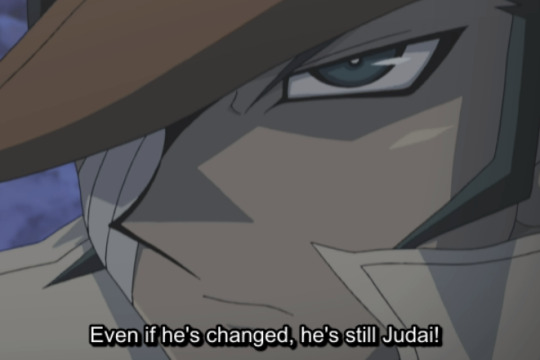
Misawa says later to Judai's face that he and the supreme king are the same person. Judai later is able to use the Supreme King's powers and maintain complete control, because the Supreme King isn't a split personality. Judai even says when Amon is sacrificing someone he loved for power, that he was doing the same thing as the Supreme King, sacrificing everything for power.
We later learn that the ritual that sacrificed four of Judai's friends was a part of Yubel's schemes, but that's the only thing Yubel set up. Judai made every bad irresponsible decision that led to his friends being captured. Judai was the one who snapped and decided to complete Super Polyermization after it was completed. Learning Yubel was behind the sacrifice ritual doesn't take away any agency from Judai at all, because Judai is responsible for his own decisions.
What it does do is create another parallel between them, because we learn the reason Yubel set up the sacrifice was to make Judai walk the same path that they did.
Judai is hurt, abandoned and isolated and in that situation he ends up lashing out at everyone around him in a similiar manner to Yubel. When Judai is put through similiar trauma, he doesn't overcome it in some heroic way because he's an innately good person, no he succumbs and behaves in ways that are incredibly similiar to Yubel.
Even when Judai's friends selflessly try to help Judai, he resists them every step of the way. He ignores their constant calls to him, their comfort, and he even fights them. Judai is eventually reached by the efforts of Jim and Austin combined, but they both die in the effort. Judai is saved because Jim and Austin were way better friends to him than he was to them.
Judai is effectively snapped out of his destructive spiral, but he's left alone with the sobering realization of everything he's done and the blood of two more friends on his hand.
When it's time for our hero to finally face Yubel, he no longer has the moral highground. Now when he faces Yubel it's not as hero and villain, they're just two sides of the same coin. Two people who when they were abandoned, lashed out and hurt everyone around them.
The question is no longer can Judai save Johan. The question now is whether Judai can live with the guilt he's carrying within him, and for that matter can Yubel live with the guilt of what they've done now too?
By this point Judai's been completely deconstructed. He's no longer the hero of the story, he's just a flawed person who needs to fix his flaws. He has the choice to live with his mistakes, and the biggest conflict now is whether he's going to save his villain foil Yubel, or strike them down in order to save the rest of his friends (the three that are left).
This also creates a much more compelling reason for Judai to save Yubel. Not just because Judai is responsible for Yubel's creation, but because they've both made the same mistakes, they have the same traumas and the same scars. Jim and Austin were willing to risk everything to save Judai even when he didn't deserve it, and didn't want it. Now is Judai capable of doing the same thing, of reaching Yubel the way he was reached, not for the sake of saving the world but for helping a friend?
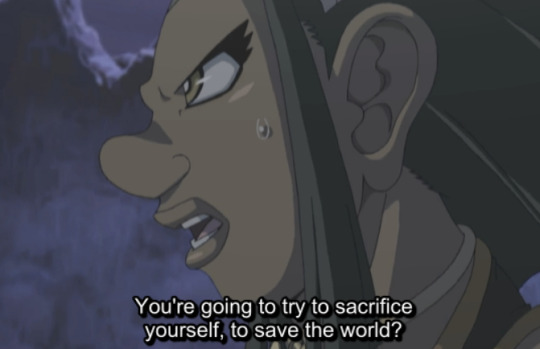
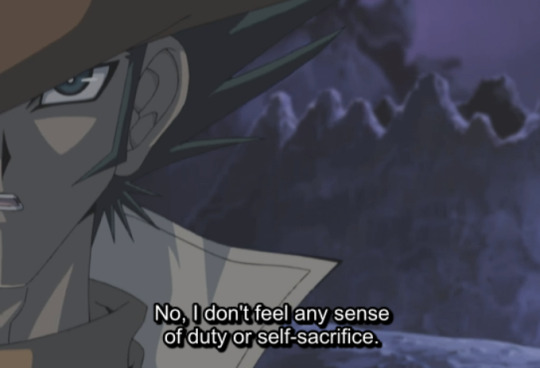
I just want to save my friend. That's all.
This is to me a very compelling setup for the challenge of whether or not Yubel can be saved. Judai's not really saving a helpless victim, he's not acting out of a sense of duty to sacrifice himself for the world, he's being challenged to save someone who suffers from all the same flaws that he does. Judai and Yubel are so similiar at this point it's really just Judai saving himself.
The Dark Deku Arc - Setup
This is the part where I'm actually going to praise MHA. Shocking I know. Season 1 and 2 of Yu-Gi-Oh GX are about 105 episodes in total. The Dark Deku arc begins at about episode 131 with Deku's decision to leave the hospital by himself to hunt down Shigaraki and AFO alone and try to understand villains better.
The 130 episodes up until that point are much better build up, than the first 105 episodes of Yu-Gi-Oh GX. To put it frankly GX is paced like ass. There's far too much filler, and because of that the plot points the anime is trying to make are delivered less efectively. In fact 105 is a good example of what I said above, that ideas are one thing and execution are another.
Season 2 especially is a season filled with good ideas and weak execution due to pacing. Here's one I use as a go-to example. There's a character named Edo Phoenix who's on a quest to find who killed his father. The ending of his plotline is he discovers that in a twist, the man who adopted him is the one who killed his father, and he's been encouraging Edo to investigate because it lets him spy on the police investigation and keep it off his tail.
That's a good twist - however that twist happens in the same episode that Edo's adoptive father is introduced. The audience is given literally no time to even get to know Edo's adoptive father, or get invested in their relationship so the twist doesn't hit at all. A better paced story would show Edo's relationship to his adoptive father early on, get you invested in them, only to pull the rug out from under you so you would feel the shock of that betrayal alongside Edo.
GX establishes its character cast, and yes the filler does give the cast time to breathe and they're all well characterized but because the plot around them is so poorly structured, none of the plot points really hit. Okay, Edo's adoptive dad is evil. Next! You can have good characters, but if you don't put them in a strong narrative framework that challenges them then those characters are just gonna kinda sit there.
The first 105 episodes of Yu Gi Oh GX does succesfully characterize most of the main cast, but it also feels like everyone's just goofing around. In comparison the first 135 episodes of MHA much more successfully builds an escalating conflict. Each new arc either introduces you to a new facet of the world, makes the amin characters more complex, or adds to the conflict.
We basically go from arc 1 "The hero high school is fun" to Arc 2 "The villains are a serious threat" to the Camp Arc "Oh shit, Shigaraki is learning and the villains are getting stronger."
When Bakugo is kidnapped at the end of the camp arc, the tension is ramped way up with the appearance of AFO, and All Might's retirement.
After that point we're introduced to the Overhaul arc, which not only again makes the League of Villains more complex and sympathetic, but also introduces the audience to All Might's more flawed side - the fact that All Might literally worked himself to death saving others and it still didn't work.
Then My Villain Academia -> The Villains are now a threat and they have an army.
Each arc builds on a previous arc, the characters and the world grow more complex, and it feels like you're learning about these complex issues alongside the characters. It just makes Yu Gi Oh Gx look like the silly card games show by comparison, by setting up this very layered world, and conflict, and heroes that challenge the protagonists on what it means to be a hero and what it means to be a victim.
Then all of that great setup.
We are side by side with the proagonist. We, like Deku now want to see if someone like Shigaraki can be saved. We, alongisde Deku want to better understand the villains and learn to see them as people. We want to know if the corrupt hero system can be salvaged.
However, these are too many questions so let's boil it down to two once more, because this is looking at Deku's character.
Deku and Judai are in some ways different as night and day. Deku is an introverted nerd and the victim of bullying, and he starts out with no quirk at all. Judai is a self-confident, charismatic prodigy who instantly seems to charm and befriend everyone around him. Deku desperately wants to be the hero and works his way up there, whereas Judai is just kind of thrown into the school hero because he's the best at dueling.
Judai is kind of a mix of Bakugo and Deku's traits, he's a self confident prodigy who always wins, but he's also someone obsessed with heroes and who has a hero-complex where he's continually forced to save others.
The Dark Deku arc, like the Supreme King Arc looks to take a darker, more introspective look at Deku's character, while also exposing Deku who is a sheltered kid to the a very grey on grey world. It also seeks to deconstruct Deku's suposed "hero complex". Despite the many differences between Deku and Judai I believe the two questions an be boiled down to the same thing.
Is Deku Selfish?
Is Deku's hero complex a bad thing?
These are the questions the series itself is asking in the deconstruction of Deku's character. Deku himself is asking if there's a better way to save villains tha just beating them down or outright killing them, but we'll discuss that later.
Just like Judai there is some setup before this to give a previously very one-note Shonen protagonist mor depth. Deku and Judai are both people who fit the determined, punchy, solve everything fist fight shonen protagonist to a T, on top of being the one to always show up to fight for their friends. Just like in the beginning of season 3, we do have some hints before this that there's something wrong with this attitude. That there's something about Deku that's not entirely there.

There's a flashback of All Might talking with Bakugo where Bakugo discusses that the fact that Deku never takes cares of himself or factors himself into the equation when he always puts others first deeply bothers him and there's "something wrong with it" that's made him always push Deku away.
This flashback also leads into a scene where Bakugo pushes Deku out of the way of one of AFO's attacks, telling him to "stop trying to win this on his own." In an attempt to make Deku see that he's not fighting alone this time.
Deku has also been warned repeatedly about the way his power destroys his own body when he uses it, warnings he's repeatedly chosen to ignore. Saving others isn't just a goal for Deku, you could arguably say it's a method of self-harm and that's what unnerves Bakugo. Bakugo even gave a similiar speech in the past, about how someone like Deku shouldn't take all of the bullying that Bakugo has given him over the years and still try to be his friend afterwards. At this point it's not really like Bakugo's done anything other than tone down the constant insults a little bit, he hasn't apologized or anything but even this early in the manga Deku has a tendency to just let Bakugo's treatment of him go. It's not like they were super best friends forever before the bullying started either despite what the shippers might tell you. Bakugo is saying it's weird that this kid just takes it, and takes it, and takes it without fighting back like he doesn't care about how people treat him and Bakugo is right... that is weird!
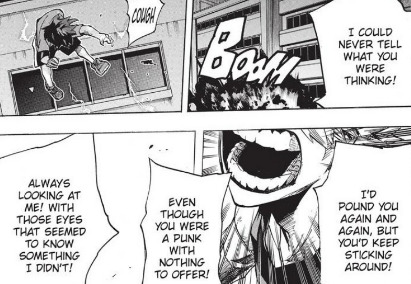
Deku either has such low standards for how he's treated that he just lets Bakugo get away with it, or he just doesn't hold a grudge when he is mistreated because his pain and his suffering just always matters less. Either way it's not healthy, and it could be indicative of a deeper problem hiding behind the surface.
Either way there's setup here, because on one hand you have everyone and their grandma praising Deku for his "drive to save others that eclipses all common understanding."
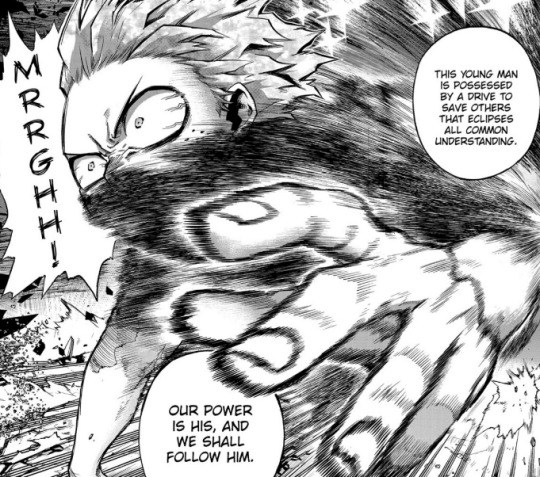
While at the same time he's criticized by Bakugo for having no regard for others. This could be the setup for the character trait that led to his earlier success leading to his downfall later. In Judai's case, everyone praises his purity of heart, but then that purity is later criticized as childishness, naivete and a refusal to grow up.
As for Deku...
How can you protect others if you can't even bother to protect yourself? How can you save others if you can't save yourself? That's the question Touka asked of Kaneki in Tokyo Ghoul when she rightly called out his desire to protect everyone at the Anteiku Cafe as just a roundabout way of getting himself hurt by acting recklessly.
In Kaneki's case he's not trying to protect anybody, he's just picking battles against the doves and getting himself hurt. He's acting out a hero complex in the sense that if he feels like he didn't fight his friends battles for them like Judai then he wouldn't have any friends to begin with. That's why Touka also says "Besides that, everyone doesn't belong to you. You have no business protecting us."
Is Deku fighting for the same reason? Does he harm himself to protect others because he views himself to be worthless and the only way to demonstrate his worth is try and fight to save others?
We don't get an answer for that question. Judai thinks duels are fun, and he's really good at them, and because he's good at dueling he's made friends. He think to keep those friends he has to keep dueling for the sake of others.
Deku's not motivated by the idea of protecting or keeping his friends, that's a secondary motivation. All we have on Deku is that he feels a strong desire to save others, and that he worshipped heroes like All Might growing up but has a naive idea of what a hero is supposed to be. However, his lack of motivation could be the "something that's missing" just like Judai has.
The GX writers did some hardcore digging into Judai's character by focusing on how shallow he was in motivation compared to everyone else, and showing that to be a symptom of his childish naivete.
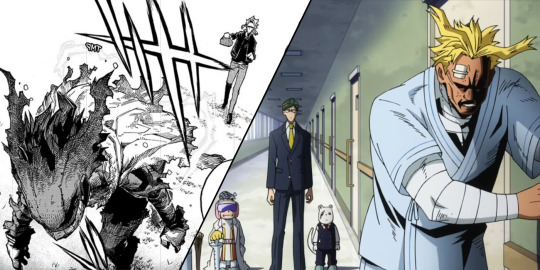
There's also the potential parallel between All Might and Nighteye's breakup, and Deku's decision to leave all his friends behind to hunt for Shigaraki himself.
Even if Deku doesn't have a deeper motivation than just "an unnatural drive to save others" then you could show the effects of Deku walking down the same path that All Might did, the belief that he has to be the one to save everyone singlehandedly and if he rests for a single moment than someone might die, leads to him not only destroying his body, but also doing permanent damage to all of his social relationships.
Even if Deku's motivation isn't too deep, you could still have the traits that led him to earlier success now driving him to ruin as the story punishes Deku for his excessive selfishness.
This is also where we finally get back to Deku's goal of understanding Shigaraki, and contemplating whether or not it's possible to save villains without killing them.
I draw a parallel between this and Judai's enemies calling him out on lacking "darkness of the heart" and that without understanding that darkness he can't win.
Judai's lack of darkness of the heart means two things, he's not mature enough to understand the reason why his enemies are fighting, and he's also not mature enough to se the darkness in his own heart which is why he ends up blind to his own flaws and making pretty severe mistakes later on.
For Deku, it's mainly a lack of understanding of the motivations of the villains he's fighting again, villains he's only ever really beat down with his fists until now.
However, for Deku lacking darkness of the heart you could also re-contextualize that as meaning because of his idealization of heroes he's never once looked at the darker sides of hero society that might have driven people into becoming villains.
Deku's lack of inner darkness may just come from the fact that compared to the villains he's fighting against, he's gotten to live a pampered life. Without understanding that darkness, he can't be a full person because he'll still be a naive sheltered child, and not an adult wise to the way the world works and the moral greys he inhibits. Either way, it's just as necessary for Deku to gain an understanding of "Darkness of the Heart' as it is Judai.

So here's all the setup for the start of Deku's Dark deconstruction arc. As different as these characters and scenarios you can still boil it down to those three narrative questions about Deku / Judai, is there behavior selfish? Are there hero compelexes a good thing? Do they need to understand darkness of the heart?
Before moving on I'm going to summarize Deku's setup as thus:
Deku's actions are selfless.
Deku's motivations are also selfless (a desire to save others).
Deku does not benefit from saving others in any way, if anything he actively harms himself in order to do so.
Bakugo finds this behavior incredibly disturbing.
All Might destroyed his body and burned all bridges because of similiar flaws to Deku.
So the answer to the first question is Deku selflish? No. Is his hero-complex a bad thing? Potentially.
While Deku himself decides that he needs to understand darkness of the heart in order to better understand villains. Deku is actually more set up to contemplate darkness of the heart than Judai is, because Judai charges into the dark world blindly with only the motivation of saving Johan not even caring for Yubel, while Deku has the explicit motivation of trying to understand the little boy inside Shigaraki.
DEKU LEFT THE HERO ACADEMY
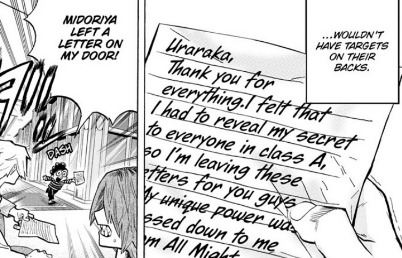
Deku begins the arc by leaving alone to go searching for Shigaraki, with hand-written letters addressed to all of his friends that tell the truth about One for All and also say Goodbye. He makes the deliberate decision to leave them behind so they don't get targeted alongside of him. It's a pretty classical superhero motivation, I need to cut myself out of my loved ones life in order to protect them. Of course this sort of ignores that everyone in his class has super-powers too, but you know heroes they're all such drama queens.
Is this selfish behavior?
This is going to be the only time I'm going to solidly answer yes. Deku clearly did not take his friends feelings into account. His desire to protect them, is more important than their own agency. They also might want to fight alongside him, they'd be upset if they saw him die or get hurt trying to protect them. Deku thinks of his own feelings of wanting to keep them safe and not being able to handle the emotional burden of protecting him, more than he does their own personal feelings.
This is also something that All Might did they permanently burned all of his bridges with his sidekick and friends, and deeply hurt his sidekick who was just asking him to take a break so he did not get himself killed and quit because he didn't want to watch All Might slowly kill himself by inches.
Deku is being selfish here, and later on when he does face his friends he even acts pretty condescending belittling them and insisting they can't fight on their own or keep up with him.
However, I need to ask a secondary question.
Is there any lasting consequences for this selfish behavior?
Besides the fact that it hurt his friends feelings for a little bit, no. I spent a much longer time covering this in Judai's sections because Judai's selfish behavior led to character conflicts. Judai disregarding his friends led to everyone starting to resent him in the Dark World, and their once tight-knit friend group further falling apart.
Judai on three seperate occasions makes impulsive decisions to run ahead without consulting with the group. The second time he outright lies to the group and sneaks ahead without them. THe second time all of his friends are captured when they go after him and try to follow him to give their support because they're worried about him. The third time he makes the decision to run ahead, he knows about the danger they're in and the risk of getting captured and he just blatantly ignores them. When Austin notices they're missing Judai doesn't even go looking for them because they're not a priority at this point - saving Johan is.
This is something that has very real and lasting consequences in the story, they're captured because of his recklessness, and sacrificed in front of his eyes. Even though they technically come back in season 4, the trust between Judai and his friends is all but gone and he's alone for a lot of Season 4.
Judai's decision to abandon his friends has direct and lasting consequences. He is being punished for his hero complex. Running ahead, and fighting alone against the bad guys is what Judai has always done and what's worked before, but now in a more complicated world it's not cutting it and Judai is being challenged for his flaws.
Deku hurts his friends feelings a little bit, but even in that case the focus is on how sad it is for Deku, how hard it must be to be a noble hero fighting alone.

Deku's Mary Jane and Spiderman bullshit never impacts his friends directly, other than the fact that they find it slightly condescending. His "I need to keep secrets from my loved ones attitude" is challenged because his friends want to fight alongside him, but there's never any narrative punishment delivered to him. It's just solved with one fight scene and a character holding out their hands. Whereas, the consequences for Judai's rash actions last two seasons.
I call it "Mary Jane and Spiderman" Bullshit, because Spiderman keeping his identity a secret from all his loved ones is a big conflict in the comics. Something that got Gwen Stacy killed, because Peter Parker never told her his identity in order to protect her, and then that just ended up with Norman Osborne finding out about her anyway and kidnapping and killing her.
You might have heard of the "Death of Gwen Stacy" it's a pretty famous moment in comics. It's also a case where it shows that the Hero's failure to communicate honestly with their loved ones in the name of "Protecting Them" can actually get them killed.
There's even consequences in MHA itself for heroes choosing to sacrifice their personal lives to help complete strangers. Shigaraki literally made a whole speech about it. Kotaro Shimura is traumatized for life over his mother's decision to abandon him instead of giving up on being a hero. Nana Shimura believed she was doing something selfless in sending her child into foster care to keep him out of AFO's clutches, but that was shown to be wrong as AFO just found Kotaro's household and then destroyed him later on in adulthood anyway.
So in the story we are shown scenarios where choosing to abandon your loved ones in the name of "protecting them" can have disastrous and lasting consequences, but as for Deku himself, the decision to leave the school has basically no consequences whatsoever.
Well, Deku making the decision to fight alone is something that might lead to some consequences. After all, Judai's breakdown came about because he always felt the pressure to fight alone and carry everyone's weight on his shoulders until he couldn't.
Perhaps, with Deku fighting alone to protect everyone we'll reach a similiar breaking point. Just as Judai couldn't handle carrying everyone's burdens, looking for Johan, and leading his friends into the Dark World all that the same time and eventually broke down maybe we'll see Deku break down because he just like All Might can't carry the burdens of an entire nation - oh wait nevermind he's working with the Top 3 Heroes.
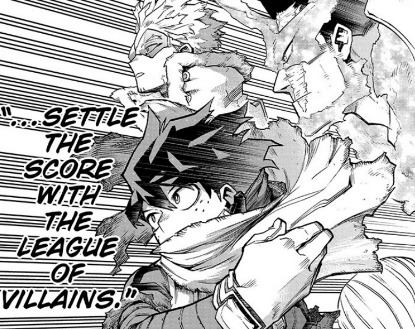
Even the premise that this is Deku leaving the school, to become something like a vigilante wandering the countryside trying to fight AFO on his own is just incorrect because Deku is receiving government assistance right now.
In the Dark World it was really just Judai and his friends, so every single bad decision Judai made had consequences because they were well and truly alone. Deku has backup so he's not even really "alone" in the arc that's supposed to be about him fighting AFO and trying to understand Shigaraki alone.
ALL YOU'LL FIND IS BLOOD AND VIOLENCE
Let's briefly focus on questions two and three, is Deku's hero complex bad, and does Deku need to understand darkness of the heart?
Judai's hero complex was based on the idea that if he wanted to have friends he needed to fight for them and solve their problems for them.
Judai got in such an unhealthy negative feedback loop, that he had to carry his friends burdens in order to maintain his friendships with them, but at the same time he couldn't receive any help from them because he made their friendship all about him carrying their burdens. He was operating underneath an amazing pressure to always win until he lost. The very thing he did to try to maintain his friendships, keeping his friends at arm's length and fighting alone is exactly what ends up driving them away and leaving him alone.
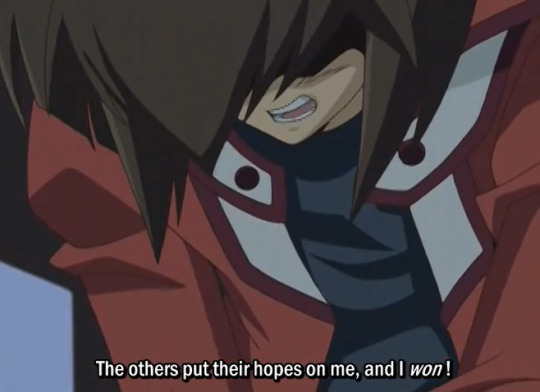
But, still...! They're all... They're all gone. There really was something missing in me. But what is it? What was missing? What should a duelist burden themselves with?
Judai paradoxically fights alone in order to keep his friend group together, which only ends up with him losing four friends and being abandoned by the rest when they're disappointed for him in his selfish behavior. Judai screams out why, realizing he did something wrong here, that something went wrong because he's been winning duels, he's been fighting the same way he did before only to end up with the worst option possible. The realization that he is truly alone breaks him down entirely.
Judai's hero complex unwravels when simply charging ahead to fight doesn't work for him anymore, because the situation becomes more complicated than that. Darkness of the heart can mean many things. Judai not understanding his own personal flaws. Judai not seeing how his flaws are affecting others. Judai not looking at other people's emotions, he doesn't hear or respond to criticism when his friends start trying to tell him how is selfish decisions making is making them feel.
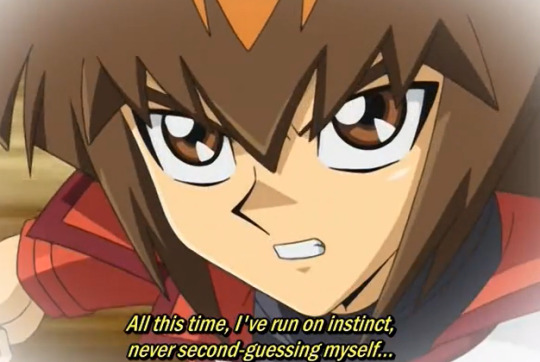
I can't just stay and wait. All this time I've run on instinct, never second-guessing myself. If I just stand still now... I'm sure I won't be able to start running again. And I won't be able to get to Johan.
Judai's hero complex has a clear source - he believes he has to keep running ahead and fighting for his friends the same way he always has in order to keep those friends and if he stops he'll lose everything / succumb to the guilt he now feels about being uanble to save Johan. His Hero Complex also has clear consequences, him running ahead without thinking gets all of his friends kidnapped and used in a sacrifice ritual that could have been avoided if he had made different choices.
Spiderman kills Gwen Stacy because Peter Parker deciding to not tell her about his secret identity to protect her backfired and made her an easy target to the Green Goblin.
Heck, Spiderman's entire character is about how the burden of being Spiderman and his Hero Complex constantly sabotages any attempt he makes at having a personal life. Miguel O'Hara's catchphrase in the incredibly popular Spiderman movie is that "Being Spiderman is a sacrifice" and he's not wrong either.
SO, is the narrative punishing Deku's hero complex in any way?
Well, the one warning he did receive that if he kept fighting he'd lose permanent loss of his arms turns out to not matter anymore because his body is just stronger now.
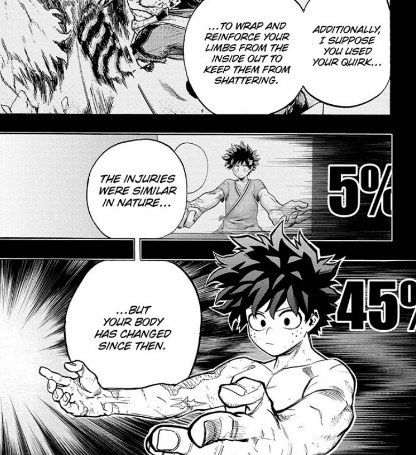
So, even the phyiscal toll of fighting alone that's a consequence for Deku doesn't actually apply here.
I keep talking about consequences but what do I actually mean? Am I talking about strictly punishment? Do bad things need to happen to characters in order to get their lessons?
Not necessarily.
When I say "consequences" I mean in terms of actions always having consequences in a story. The best stories are succinct, that means you basically cut down in as many frivolous details in a story as much as possible so everything that happens onscreen is something that matters and contributes to the whole. Therefore, every action should have a consequence directly seen onscreen in story. Stories are all actions and consequences, the choices the characters make should have direct impact on the plots and the other characters because it makes those choices seem like they matter.
If the story constantly draws attention to the fact that Deku is afraid of ducks, but the story takes place on the moon and there are no ducks living on the moon then that's a wasted plot thread because there are no consequences. If a character does something bad, other characters should discuss it, or it should negatively impact them in some way.
When Judai decides to run ahead without all of his friends for the first time after they all agreed on a plan, the result is the next episode they all start talking about their shared doubts with Judai when he's not around. If they all just swept Judai abandoning them under the rug, then Judai running ahead and leaving the others alone doesn't feel like an impactful character flaw.
There's no lasting consequence for Deku's hero complex. It doesn't drive him to any kind of breaking point like it does Judai.
I think the reason why is because there's no real moment of failure for Deku. When he tries to ask Muscular why he fights, and Muscular rejects him and says that he was just born evil and has no deeper motivations, Deku's not frustrated at all.
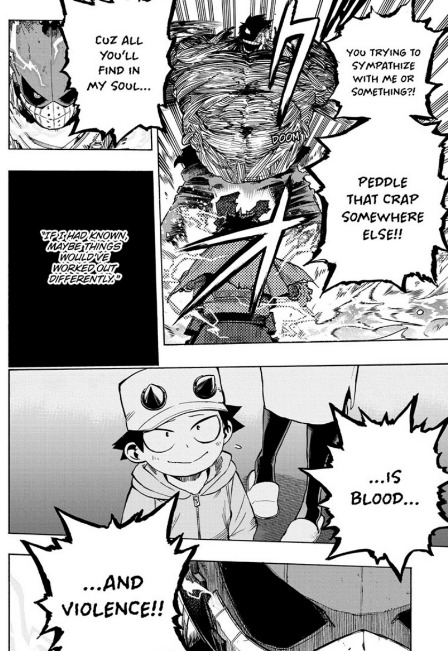
Deku who feels a "unnatural desire to save others" isn't really bothered by the fact that Muscular insists that he can't be saved and that they can only fight. Despite this technically being a failure, Deku has failed to talk a villain down, failed to find a way other than fighting and also failed to understand the darkness in someone's heart it's of little consequence because it's not framed as a failure.
Deku just punches Muscular, back to the drawing board.
There's another manga called Choujin X running right now, where the main character is on a similiar quest trying to see if there's a way they can save the big bad Sora Shihouhin, and when he is forced to fight against a villain who won't back down, de-escalate, or listen to reason he has a complete emotional breakdown.
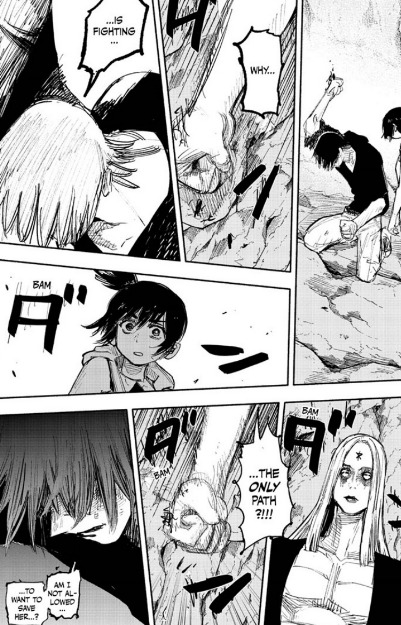
This is the reaction of someone who's genuinly invested in the idea of saving the villain, and frustrated with the reality that he might not be able to save her, that he can't talk to the villains or convince them to back down. Tokio's not even characterized by an unnatural desire to save others like Deku is, so why is he the one breaking down and not Deku someone apparently so selfless that he wants to save the mass murderer that's trying to destroy society?
If Deku's desire to save others is so strong why doesn't he show frustration at being unable to talk down, or understand Muscular?
Judai is stuck in a negative feedback loop where he's forced to fight for others, because he believes he has no worth to his friends otherwise. All we're told of why Deku feels the need to save everyone around him is that he's just like that, he just feels like saving everyone no matter who they are the moment they come into view.
If we're choosing to characterize Deku that way, then number one he should be attempting to save everyone, and number two the stress of having to save everyone is something that should get to him. His "Hero Complex" should be what's breaking him down at the moment. The unnatural desire to save everyone around him that led him to so much success should be what's punishing him this arc.
Judai felt pressure from two aspects, first the pressure to carry everyone's burdens, and second the lack of understanding of darkness of the heart. Unlike Judai who doesn't want to understand darkness and who avoids it as long as possible, Deku goes into this arc actively seeking to understand how his villains think.
Deku and Judai also suffer from a lack of darkess in their own hearts. This leads to them having empty motivations. Judai has a childish desire to enjoy fun duels. Deku has a childish desire to save everyone. Neither of them have tried to grow or change or even question those motivations in any way and because of that they're stunted people.
Judai doesn't know why he fights. He doesn't question why he fights. He just takes on the burdens of others to give him something to fight for. This all together leaves Judai blind to his own personal darkness, and also because of that blindness he can't grow in any way because he never evaluates himself, he never looks at himself and tries to change.
When he's on his knees and at his breaking point he screams at the top of his lungs, "WHY? WHAT AM I MISSING? WHAT DID I DO WRONG?" simply because Judai's never thought about these things.

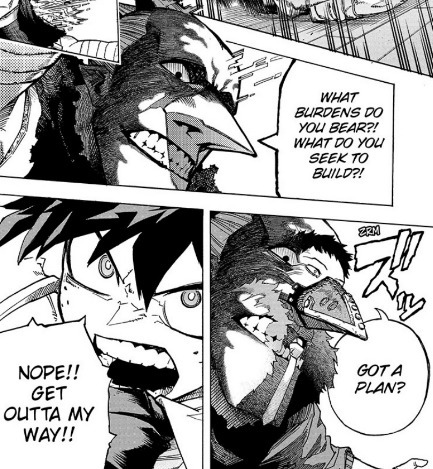
Deku's asked these same questions both in the Dark Deku arc, and hundreds of chapters later he's asked what he's planning on doing as a hero in order to make things better and Deku never materializes an answer.
Pre-Dark Deku Arc, during Dark-Deku Arc and Post Dark Deku arc, Deku always solves his problems by recklessly jumping in and saving others. There's never any point where he's punished or criticized for this behavior in any significant lasting way. He never has to self reflect and develop a reason on why he wants to save others, or eve think about how he's going to save others, he can just keep acting as the rash, impulsive hero.
Judai and Deku are both characters who are empty, and lacking in motivation but Judai is ruthlessly criticized for that until he reaches his breaking point and is forced to look at his motives.
This once again comes from a lack of failure on Deku's part. Deku never fails the way that Judai does. There's a scene where you could have easily had Deku fail. The entire Nagant vs. Deku fight where Deku fails to give her any substantive answers to his questions.

Imagine if Deku's simple philosophy of always extending a helping hand failed here. Imagine if Deku actually got deeply ivnested in the idea of saving Lady Nagant, and did his beset to talk and reach out to her but his answers weren't enough and because of that she just chooses something like suicide. Imagine he has her by the hand, and she's dangling off of the roof and he thinks that his impressive move to save her should have been enough - he's reached out a hand like always. He thinks this should have won her heart over, by showing her that someone still cares in all of her despair.
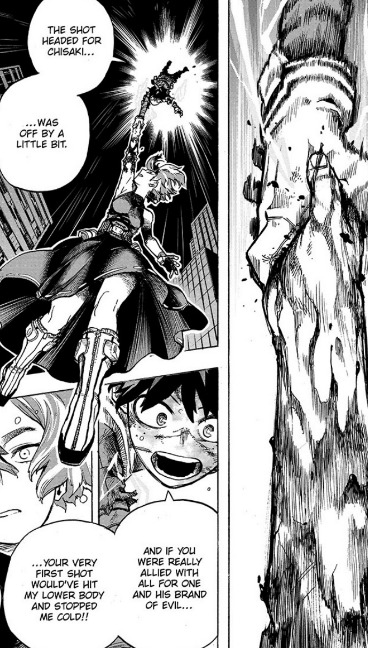
Then, Nagant in one final spiteful move lets go. The person he heard her entire backstory, the person maybe he once was a huge fan of her when she wasa hero, the person he wants to save the same way he wants to save Shigaraki chooses to let go and fall to her death because dying would be better than living in whatever kind of corrupt world that Deku is trying to build.
This could be Deku's Gwen Stacy moment. Spiderman carelessly webs Gwen Stacy whe she's falling to catch her and for a moment he thinks he's saved her because he's overconfident and has caught people falling like this a thousand times, only to find out he's snapped her spine. His overconfidence, his hero complex making him believe everything magically would work out led Gwen Stacy to her death. This could show the simple act of just offering a hand out to someone in need isn't enough, without empathy and understanding.
Instead, AFO just blows Nagant up in Deku's face.
Except, that isn't even a failure bcause Nagant turns out to be just fine! There's no point in blowing up Nagant except for the spectacle of it, because she turns out to be fine five minutes later and even shows up to fight in the next arc.
There's no consequencs to anything that happens in this scene. Deku doesn't suffer any consequences for being blind to the faults of society. (He's working right alongisde a killer cop just like Nagant and he doesn't even care.) Deku isn't forced to reflect on what saving people or making society better would even mean. He also isn't punished for his lack of understanding the way that Judai is.
Afterwards, Deku denies help to a very mentally-ill Overhaul, who is apparently not one of the villains that Deku wanted to save. There's a whole buch of asterisks on that "Deku wants to save everyone***" goal. This also isn't framed or used to paint Deku in a bad light because Overhaul is unworthy of salvation in Deku's eyes for hurting Eri.
Is this action part of an arc? Is Deku reaching his limit with trying to sympathize with villains only to see people like Overhaul and Muscular fighting him every step of the way and telling him they don't want to change?
Nope, this scene is never brought up again.
Deku never fails, and he never does anything wrong. Even when there are situations where you could argue he does do soemthing wrong, like denying the armless, mentally ill Overhaul help - he's not painted as being in the wrong.
The entire arc is supposed to be about criticizing the protagonist for their hero complex, and their lack of understanding of the darkness of the world but for Deku there's no criticism to be had here.
Compare this to the sacrifice ritual in the Supreme King Arc, where not only does Judai fail to save his friends, but the friends that survive ruthlessly tear into him aftewards for his selfish behavior. THe actions of one protagonist matter, have consequences in the story and are criticized. The actions of another protagonist have no real consequences and are never criticized.
The whole mansion blows up and... nothing happens. No one's injured in the explosion. It may as well have not happened in the story because there are no consequences for Deku just continually choosing to blindly run ahead like his hero complex tells him to.
There's evena moment where Deku winds up in a similiar situation to the dark ritual. After receiving information from Nagant, he blindly wanders into a mansion in Haibori woods believing it to be AFO's base, only to find out it was a trap and AFO was waiting for him to blindly charge in all along.
THAT'S WHAT MAKES US HEROES AND VILLAINS
This is where I'm going to talk about another big similarity between Deku and Judai, and also the biggest point of divergence in the Dark Deku and Supreme King Haou arcs.
Deku and Judai are both character foils with Shigaraki and Yubel respectively. This is where I'm going to praise MHA again, surprising everyone.
The foiling between Shigaraki and Deku is masterful. They both started out in relatively the same place, as boys with dreams to become heroes who were softly told no by their parents. Tragedy struck Shigaraki and he killed his family on accident and wound up alone wandering the street for days until he was found by AFO.
They're both the students of the greatest hero and villain of the last generation. They both end up being surrounded by a group of close Nakama that they want to protect. They're both continually challenged to grow up, and show how they're going to be better than their predecessor for the hero and villain sides respectively. They both have to prove they are worthy successors. Shigaraki has all the heroic spunk and determination that Deku has but on the villain's side, and while Deku loves heroes, Shigaraki is hero society's critic wants to bring down the hero system that didn't save him.
You get the feeling that Shigaraki really is Deku just in a different situation, a same person on the opposite sides of the conflict kind of character foiling.
As the biggest Yubel stan here, in some ways the foiling for Shigaraki works better than the foiling for Yubel because Shigaraki isn't just Deku's foil, he's the foil for all of society. Yu-Gi-Oh Gx takes place in a society run where everything centers around card games, it's not really that deep. In My Hero Academia you have that 100 episodes of great setup where Deku is not only learning to look at the darkness within himself, but also the darkness within hero society around him.
Judai's narrative as much as I love it, is entirety about Judai.
Not only could Dark Deku arc develop Deku's character, it could also say something deeper about the world it's taking place it, because Deku has all these connections to Shigaraki, who also kind of represents the orphaned boy failed on all levels by the society around him.
Shigaraki is the shadow of -> Deku, but also Shigaraki is the shadow of -> all of society.
Yubel is the shadow of -> Judai, and only relates to Judai's personal growth.
Yubel is Judai's personal villain, and was created by his actions as a child. His decision to abandon Yubel into space, led to Yubel being tortured and their later madness.
Yubel is also Judai's shadow. They carry all the same flaws, but those flaws are obvious in Yubel and repressed in Judai. Yubel's belief is that Judai is someone who purposefully enjoys hurting their friends, and that's how he shows his love. While that's twisted it's not hard to see how Yubel came to that conclusion. After all, Yubel loved Judai so much only for Judai to abandon them and turn a blind eye to their suffering. In the Dark World, Judai abandons his other friends continually in order to search for Johan, and they wind up suffering too.
While Judai doesn't sadistically enjoy hurting others as Yubel put it, there's an element of truth to Yubel's criticism. Judai does abandon people, Judai isn't as empathic as he seems to be. When Judai is subjected to the same kind of isolation and abandonment that Yubel has endured for the past ten years, Judai loses his mind a whole lot quicker and starts lashing out at everything around him the same way Yubel has. Judai without the love of his friends starts to hurt everyone around him in his lashing out, the same way that Yubel desperate for love starts to inflict pain on the people she loves. Even before the ritual happened, Judai was unwittingly hurting his friends with his own selfish behavior.
Yubel's stated criticism is "of Judai is "Anguish and sorrow born from loneliness. That is the nature of love as you taught it to me" and further beyond that "When you forgot about me, I suffered. It's hot. It hurts. I am in pain. Why? You know how much I love you? Why did you do this to me, Judai? In that moment I realized that was how you showed love. Because you loved me, you hurt me and made me suffer."
That sounds crazy, but hasn't Judai been hurting the people he loved for his own selfish reasons this entire arc? Is it that crazy then to conclude that neglect and abandonment must be how Judai treats everyone he loves, so surely he loves me.
One of the biggest criticisms of this arc is how Judai's behaviors impact his relationships, so of course his most personal villain and foil is his jilted ex nonbinary dragon lover. On a less joking note, when Yubel was displaying troubling behavior as a child, Judai's first response was to abandon them. Which is ironic for someone like Judai so paralyzingly afraid of being abandoned that he became everyone's workhorse and worked himself to death solving their problems for them. Who when abandoned by those friends finally, snaps just as hard as Yubel did when they were abandoned.
Do you see the parallel I'm drawing here? Judai is slotted into the spot of the protagonist who's friends with everyone he meets, who loves and fights for his Nakama. Yet under closer scrutiny he's shown that he doesn't really understand what love or friendship is or how to give and receive love from others in a healthy way. His antagonist is his former childhood best friend, who is obsessed with love and demands that Judai love them back. Judai's lack of understanding of relationships and love takes a dark twist with Yubel, their shadow, foil and antagonist.
These are once again very personal challenges to Judai, society doesn't really factor into this equation. Though, Judai is somewhat challenged as a hero because there's an irony to Judai plunging into the world to save his best friend Johan who he's known for like three weeks, but not really lifting a finger to save the antagonist of the arc Yubel who he's known since childhood and is personal responsible for putting through torture.
That hypocrisy there too, is a personal challenge to Judai that paints him in a less heroic light. He wants to save Johan and ignore Yubel because it's easier, because saving Johan relieves him of his guilt. He doesn't even know what to do about Yubel, so he doesn't try and falls back on his previously established behavior of playing the hero.
The hero is really just a mask for Judai at this point, something the story has ripped right off of his face by the time it comes to face Yubel.
There are two ways in which Yubel serves as an ultimate foil to Judai.
Yubel acts like a callout post to all of Judai's flaws
Yubel represents a dark path Judai could have taken.
This second one is what Shigaraki and Deku have in Common with Judai + Yubel. There's something deeply tragic about the idea that while Deku was making friends, getting taught by a loving teacher like All Might, Shigaraki was all alone being pushed by a ruthless manipulator like AFO into becoming the worst villain.
Judai and Yubel's lives follow the same tragic parallel path. They began in the same place as childhood friends, but after abandoning Yubel, Judai spent the next ten years growing up, making friends in a healthy and safe envirnoment while Yubel the one who was abandoned was alone in space desperately crying for Judai to come save them only to be ignored because Judai has long forgotten them.
However, there's a striking difference there too. Yubel is created directly by Judai's neglect and actions. Whereas Shigaraki is created by the neglect of all of society, it's not Deku's fault directly.
#1 Shigaraki acting as a callout post to Deku's Flaws
However, this is where Shigaraki's callout post comes in. Shigaraki gives a long speech on how the existence of heroes itself, creates villains like him.
"You heroes pretend to be society's guardians. For generations you pretended not to see those you couldn't protect and swept their pain under the rug. It's tainted everything you've built. That means your system's all rotten from the inside with maggots crawling out. It builds up little by little, over time, you've got the common trash all too dependent on being protected. And the brave guardians who created the trash that need coddling. It's a corrupt, vicious, cycle. Everything I've witnessed. This whole system you've built has always rejected me. Now I'm ready to reject it. That's why I destroy. That's why I take power for myself. Simple enough, yeah? You don't understand because you can't understand, that's what makes us heroes and villains."
To break it down simply, heroes look away from the faults in their society, they intentionally ignore the people they cannot save, and when those people turn into villains the heroes beat them down hard. The villain attacks then convince the common people of the need for heroes, and the cycle perpetuates itself. This is all powered by the people's blind, uncritical faith in heroes.
Deku is a person who has that same blind, uncritical faith in hereoes, and until this point has never thought of Shigaraki as anything more than a villain to be punched until he stops. Which is why this is still a callout post that applies to Deku, because Deku's blind admiration for the Hero System is part of the problem that enables the very flawed hero system.
Deku does not understand darkness of the heart, therefore Deku does not understand that heroes could possibly be bad, and he could possibly be supporting a bad system until he's slapped in the face with it.
However, is there a lasting consequence for Deku's blind support of the hero system?
Nope.
I just described up above what could have been a consequence, if Lady Nagant refused to have faith in Deku since he didn't back his words up with action.
Deku also clearly does not want to break away from the corrupt hero system that created Shigaraki, because the heroes that he brought along to fight with him are Endeavor, Hawks and Jeanist, a child abuser, a state sponsored murderer, and a guy who makes bad puns. He doesn't change any of his bahavior that enables the corrupt system to stay in power.
Not teaming up with the Top 3 heroes, and deciding to go full vigilante would have at least have been breaking away from that system.
This circles around to a big underlying problem in this whole arc in that Deku isn't really doing anything different from what he was doing before, and he's not punished for his character stagnancy either.
So we're left with.
#2 Shigaraki represents a dark path that Deku could have Taken
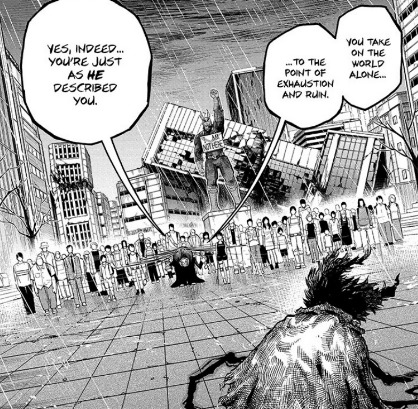
This is where Judai / Yubel succeeds and Shigaraki / Deku falls flat on its face.
When pushed to his absolute limit after failing repeatedly, Judai snaps. With no friends left he decides that all that matters is power. This path seems natural for him because we've already seen what being abandoned and left alone can do to a person and how it twisted Yubel. The story hints again and again at Judai's blood knight tendencies, and that he thinks the only thing he has of value to offer others is strength by fighting for them.
He loses his friends and the fighting is all he has left.
At the point of despair he decides to just embrace power. If he cares about nothing more than strength, at least that will give him some sense of control over his life after the out of control tragedy that happened to him.
"Yuki Judai. In order to defeat evil, one must become evil. In a world with the law of the jungle at work, one must rule with power." "Power? I don't have that kind of power." "In your hand lies the super polymerization card. Defeat any spirits who may oppose you, and combine their lives into it to perfect the card."
Supreme King is just a villain persona that Judai adopts to as a protetive blanket for all the hurt and pain they've gone through, just like ding, ding, ding, the villain persona Shigaraki Tomura is for Shimura Tenko.
Judai snapping under such intense pressure shows us that if even the faultless hero can snap, then how much can we blame the villain for snapping under similar circumstances? Maybe the reason both the hero and the villain fell is because they're both equally human and to fall down is human.
Deku never falls down as hard as Judai does. He doesn't even fall down and scrape his knee. There's no instance where he fails to save anyone. There's no instance where his actions hurt anyone. There's no instance where he takes things too far and hurts a villain. I kow it's unlikely for Deku to turn into a villain, but he could have at least gotten so frustrated he turned into a punisher style vigilante! Is that too much to ask?
There's not even a single moment where Deku goes too hard in a fight and injures or even kills a villain. They could have pulled an "I thought you were stronger" moment like in Invincible.
I don't know why this is called the Dark Deku arc because there's no darkness in Deku's heart for him to exploit, nor is he actually called to better his understanding of the darkness in others hearts. Judai understands Yubel's darkness because by the end of his personal arc he's been there, he's not the hero he's the atoner. He can either punish Yubel, or hold a hand out to help Yubel atone.
Deku's arc might as well be called the "My Little Pony Friendship is Magic Arc" because he never does or confronts anything dark. His worst crime is not showering. All that isolation and his repeatd failures in hunting AFO down should have worn Deku down, but it didn't because he's just that special of a boy!
Deku's hero complex also is completely uncriticized from beginning to finish. Judai's hero complex is an unhealthy behavior that utterly destroys him. Deku's hero complex is a job interview flaw.
FRIENDSHIP IS MAGIC
Just to hammer my point in I'd like to compare these two scenes. One is in the middle of the Supreme King Arc, the sacrifice ritual scene where all of Judai's friends are blaming him for the fact that they're about to be sacrificed while he's still trying to save them.
The second is the climax of the Dark Deku arc, where all of Deku's friends are showing up to fight him and convincing him to accept their help.
Just look at how vastly different these two shows treat their shonen protagonists when it comes to his flaws.
For the ritual sacrifice scene. This is immediately after Manjoume wakes up to find that he has been chained and kidnapped with Judai standing right there.
Judai: Sit tight! I'll save you soon! Manjoume: Wait, is he dueling? JUdai you damned idiot! Weren't you going to save Johan with us!? Getting yourself all flared up. You didn't even stop to think about us at all, did you? Judai: That's not it. Manjoume: That's just how you are! You were the only one in your kingdom from the get-go. We were the idiots for getting all motivated with you and feeling some sense of friendship with you being like that!
Then Judai watches helplessly as Manjoume dies. His other friends don't fare much better.
Kenzan: Big Bro? Why'd you want to save Freed's comrades when it meant sacrificing us-don!? Judai: You're wrong. That's not it. Fubuki: It's painful. This pain isn't just physical. It's the pain of a friends' betrayal that I have tearing my soul. apart. Asuka: I'm being betrayed and sent away by you. To think that I'll have to bear a sadness like this.
All of Judai's friends die spitting on him and telling him what a terrible friend he is and that this is all his fault. Which it is, because his decision to abandon them got them captured and led up to the sacrifice ritual.
Now, what scathing criticisms do our heroes have to give Deku after he left them all behind to fight Shigaraki alone?
Denki: Midoriya! We get that all for one is really importnat but you got something even more important in your life! Me and you we aint'g otta ton in common, but you're still a friend! Even if we gotta force this friendship down your throat. TodorokI: What a look you have on your face. Is this resposnibility so much that you can't let yourself cry? Seems like a burden you should share with the rest of us. Uraraka: The thing is Deku, we don't want to be protected by you and reject who you are and what you're doing, we just want to be with you (this part is narration).
Deku is told that none of his friends are mad, they want to be by his side no matter what, and that it's okay for him to cry.
I should also mention how underdeveloped this supposed nakama group is in the manga itself. The entirety of Season 3 of GX is tha the bond between Judai and his friends are more shallow then it appears, but he's also spent two whole seasons bonding with a group that consists of: Asuka, Sho, Kenzan, Fubuki, Manjoume. That's six people total including Judai who serve as is primary friend group. Their friendship is more unhealthy than it appears, but Judai has spent the past two seasons hanging out with one small friendgroup.
Meanwhile the entirety of Class 1-A shows up to tell Deku how much they love him and how much he means to them, and Deku's hung out with maybe like... four of them?
You have one bond shown to be how shallow it is, and one shallow bond treated like it's the deepest, most loving friend group in all of fiction. Deku doesn't even receive some lgiht criticism for how inftantalizing it was for him to abandon them for their own protection, because no one resents Deku or is capable of holding any negative or critical emotions towards him whatsoever. He's just told how much everyone loves him and wants him to come home.
And yes, Judai also does get two characters sacrificing themselves to try to reach him when he's the Supreme King.
However, as I stated above Jim sacrifices himself to help Judai because that's who JIm is as a person. Austin does it after Jim fails, both to honor his friendship with Jim, and also because of someone who got scared and ran he feels like he has to confront the darkness of the heart.
Jim and Austin O'brien's sacrifice is also a sacrifice. They died trying to save Judai, and Judai has to wake up with the knowledge that not only did he kill a bunch of people in his quest for power, he killed two more friends who were only trying to help him.
At the end of the arc, Judai has woken up with the knowledge that he has done bad things that can't be taken back and he's barely better than Yubel at this point.
At the end of the Dark Deku arc, Deku gets a speech from Uraraka about how amazing and selfless he is, and how he never gives up and how he always pushes forward, and how everyone at the UA shelter should appreciate him more.
The Supreme King arc exists to criticize Judai. The Dark Deku arc does nothing but flatter Deku from beginning to end.
Judai's hero mask is ripped off and he's forced to be a person. Deku's hero mask stays on, his hero complex is unchallenged, and he's praised for being teh greatest hero evarz.
I often get accused of not liking MHA simply because I expect it to be a different story than what it is. That I want it to be darker, when it's a more optimistic shonen manga.
However, here's my secret. I hate edgy superheroes. I don't like watching stuff like The Boys because it gets too dark for me. The oly reason I read invincible is because my friend told me that Omni-Man got a redemption arc. My favorite DC Superhero is Superman. My favorite Superhero of ALL TIME is Spiderman.
The thing about Spiderman though, is that it is hard to be Spiderman. The entire point of Peter Parker's character is that he has a terrible work/life balance and constantly loses people around him because being Spiderman is a sacrifice. The story doesn't bend over backwards to praise Spiderman as being a selfless hero, in fact it points out what a loser he is constantly. Peter Parker's friends are always frustrated with him and he's a wreck of a person.
Yet, the fact that being Spiderman is such a sacrifice and he keeps choosing to make it, shows what kind of person Peter Parker is, and that's just a person who does whatever he can to help out.
Even Peter Parker, the nicest, most well-intentioned boy ever has the Symbiote arc. One of the most famous arcs in comics dealing with Peter is when he lets Venom graft onto his suit, and even though the symbiote makes him violent, and makes his behavior change he spends the longest time not wanting to peel it off because the power boost the symbiote suit gave him made his life that much easier.
Dark Deku is an obvious reference to the Venom Suit, but a completely shallow reference because Dark Deku acts exactly the same as regular Deku the only reason he looks like that is he forgot to take a shower.
Superhero stories don't need to be Dark Deconstrutions, but they do need to be SOMETHING. They need to say something about the character. The problem with the Dark Deku arc isn't that Deku didn't experience a villain arc.
It's that nothing of consequence happened in the entire arc. Nothing changed. The story asked us if Deku's hero complex was a bad thing, and then it didn't deliver any answer. The story asked us if Deku needs to understand darkness better and then didn't answer that.
These are ideas that the audience promised were going to get answered. We were told Deku was going to get his development this arc that he was going to be pushed to the edge. The entire premise of this arc was that it was supposed to better help Deku understand Shigaraki and Hero Society only for Deku to not learn about either of those things.
Deku's learned nothing. We've learned nothing. Nothing has changed in the story itself. The only thing we've accomplished was wasting a lot of time that we could have been using watching Yu-Gi-Oh GX!
#mha meta#ygo gx meta#yu gi oh gx#yuki judai#judai yuki#supreme king haou#supreme king jaden#supreme king judai#yu gi oh gx meta#dark deku#ygo#ygx meta#ygo meta
295 notes
·
View notes
Text
Camus character analysis: games VS anime


If you finished the Uta no Prince-sama anime and your opinion of this man is "wow, he's kinda terrible," I don't blame you. in fact I've seen a lot of people say this
In this post, I want to talk about his characterization in the games and give my two cents on what the anime was trying to do with him, especially in his single focus episode Saintly Territory (S3E6).
Disclaimer: I wrote this on a whim because I'm sick and stuck at home so if anyone reads this, sorry I might go all over the place
Spoilers for all of the games!
The "be my slave" thing
Starting with Anime Camus's most egregious crime: treating Haruka like a servant/slave (however you want to translate it)
Basically in his focus episode, Haruka is tasked with writing a song for Camus. She wants to learn more about him in order to write it, but Camus will only let her follow him if she acts as his servant. She accepts without complaining, Cecil is rightfully angry, Haruka continues anyway and the song gets completed.
Now, am I about to say that Game Camus would never do this? No because he literally does lmao.


The anime doesn't pull this "servant" plotline out of nowhere, here's the context in his route:
Haruka accidentally overhears Camus talking about a plot to assassinate Saotome on the phone. When he notices that she heard everything, he basically tells her that he has to kill her now. But if she served him, he'd be able to keep an eye on her, make sure she doesn't leak anything, so she could escape death.
Okay uh "work under me or DIE" isn't exactly better, nor is it a good start to a love story, but I'm not finished!!
(A side note: I have to add that the anime made him look like an even bigger asshole and borderline dumb when it came to the things he made her do. Like he expected her to know that snapping your fingers means you want coffee without prior explanation. bro
^This might have been for comedic effect but I promise he can be actually funny and endearing.)
What the anime couldn't cover
The Camus episode wraps up with Haruka pulling through and writing a song that makes Camus "sincere," he says it's cool at the very end and that's the episode. I think the problem is that we technically didn't see him being sincere or what that even means to him, besides when he was singing (banger song btw)


It's a shame because in a 20-minute episode you really can't show the game experience of slowly piecing together what this man's problem is.
First of all, in Debut and AS you'll be quick to notice that he always has homeland and duty on the mind, constantly reminding himself that he's in Shining Agency/Japan for a reason, and it's NOT to have fun or make friends
The truth is, he slowly starts to appreciate the banter with his colleagues, music, and working there in general.
But because of his initial mindset, he has to rationalize & justify every connection he forms, like "it's just for work" or worse: "actually it was ALL A LIE and I NEVER ENJOYED A SECOND OF THE TIME WE SPENT TOGETHER, I'm such a great actor haha"
He uses that to fool himself and to push the other person away so it doesn't happen again. This scene is probably the best example:
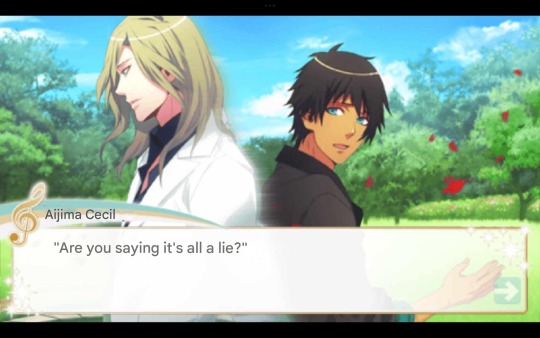
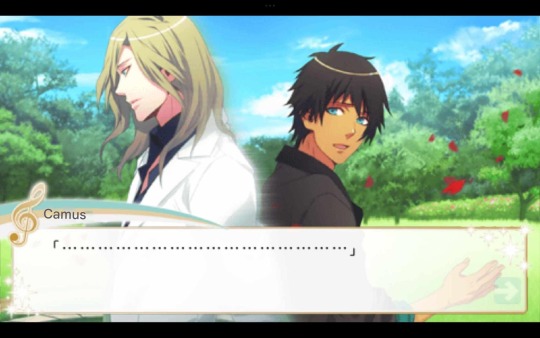
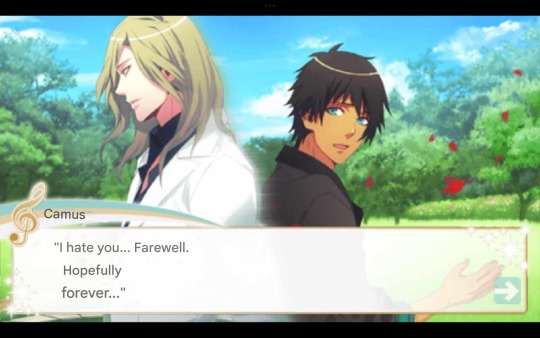
(I'll be using google lens because it's faster but I checked that the tls were okay)
He also does this in the Non-Fiction drama, which may or may not have actually happened, but I think it's still a pretty good reflection of what could happen in reality because he tells Ranmaru their bond was a lie, then mopes around in his guilt thinking about the good times and wondering why he's sad, and THEN later doubles down on the "it was a lie, I don't care about you" because he just can't let himself get attached to anything.
Basically, he's terrified at the thought of forming actual bonds because he genuinely thinks he's nothing if he stops being a cold weapon:
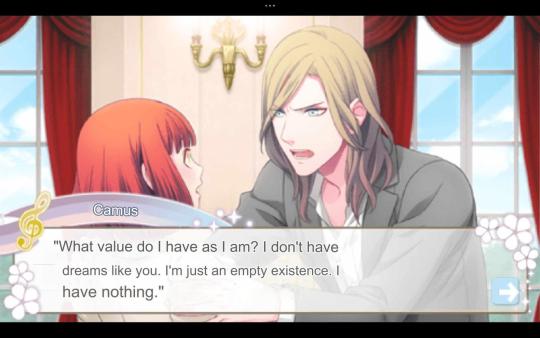
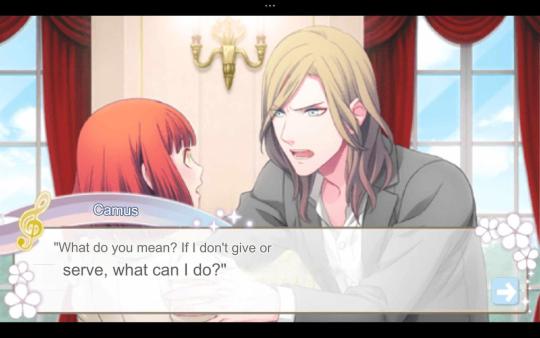
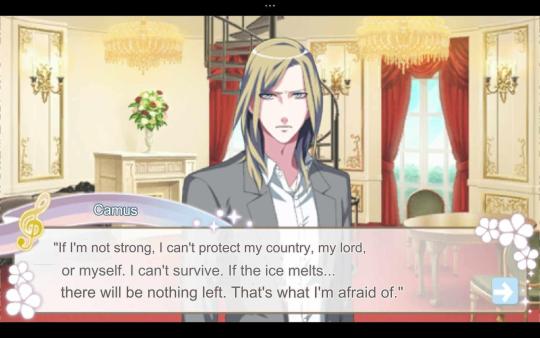
At one point he does admit he sucks (as a love interest)-
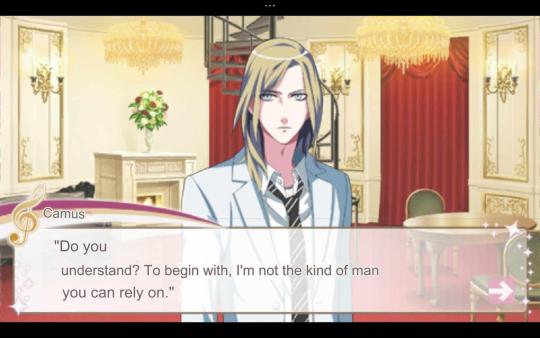
-which is pretty huge by utapri standards. I love these games, but the amount of times where a male lead does something icky, and everyone, including Haruka, acts like it's normal or like it's Haruka's fault is ehhh but I digress
Upbringing
Of course he's very proud of his homeland and status, but sometimes it's to the point of thinking he can't be anything other than his title. So why is he like this?
We got to hear about his childhood from Camus himself a few times, and it often ended with Haruka thinking "wait? that's kinda messed up?" and Camus insisting it's nothing/it's normal so yeah that's something...
His parents were in an unhappy arranged marriage, and his mother was forced to birth an heir which traumatized her so much that she can't see Camus without falling ill. Overall it's a pretty tragic situation since what happened to her was horrible, though not Camus's fault either. Even now she refuses to see him, and I wouldn't say that makes him sad because he never really met her, but simply knowing of her sacrifice probably adds a lot of pressure. As in, he only exists for this one purpose (inheriting his father's title and serving the country), so if he doesn't play his part correctly, it would have all been for nothing.
He was raised by his father not as a child or son but as the heir, always treated and judged as an adult (even during physical training apparently, make of that what you will)
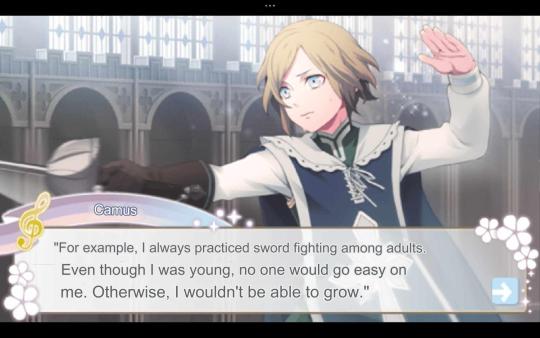
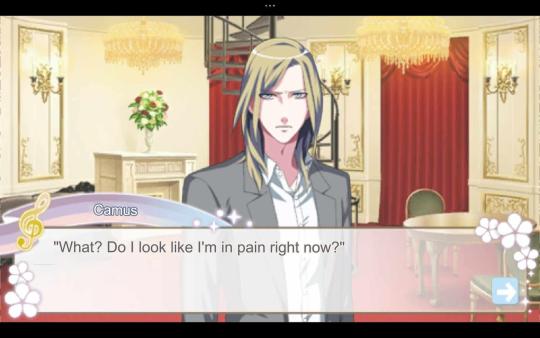
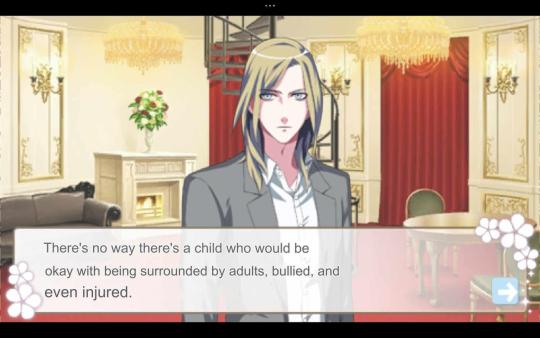
When Haruka asks about childhood memories he has a very hard time finding something that doesn't have to do with his duties or the nation. And then admits he didn't truly have a "childhood" since he was never treated like a child
As for the queen, I think his love for her is sincere: she taught him a lot of things growing up, and according to him, she's also a victim trapped by her duties so he wants to ease the burden.
So hypothetically, if he found things or people that made him happy in Japan, he would feel obligated to lock them away because that happiness is incompatible with his life: he'll have to leave when his mission ends, he shouldn't be spending time on things that aren't "useful" as he doesn't have the free will to pursue them
In his mind he's completely tied down by the fact that he was born and raised for a single reason, and the fact that he does want to serve the queen.
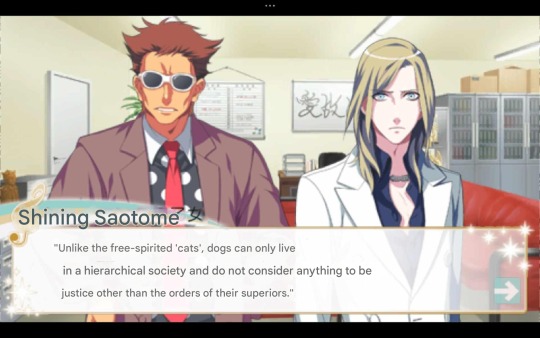
(This is Saotome describing him btw)
Also it might sound ridiculous to bring his self-worth into question because of how pretentious he is, but I've counted a few situations where he seemed to have complete disregard for his own life, only worrying about Haruka and Cecil's safety in scenes when they were present. And he thinks wanting to be loved unconditionally is a childish thought he shouldn't have.

"Double Face" was a lie. There's like at least 10 layers
On the surface he does have two personas, his perfect polite butler act for the media, and his cold bitchy attitude off camera. But honestly, even when he's not acting as a butler, he's often putting up a front to hide any form of vulnerability (from himself as well)
His main struggle is finding who he is outside of what he's being told to do. Before, he never actually stopped to think about what he WANTS because it just never occurs to him, or if it does he ignores it.
That's why realizing that he has his own desires is essential to his character development, and him staying with Quartet Night (and Haruka in his routes) is so important. It's why Reiji feels the need to reach out and when he does, Camus either freezes up or tears up;
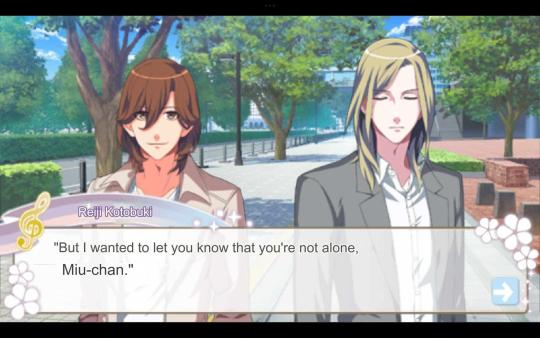
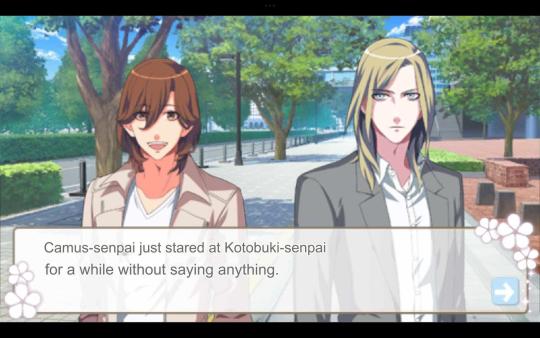
This all makes him the opposite of Ranmaru (being true to yourself and sincere), and similar to Ai (gradually learning to view the world in a less cold and logical way), but I kind of want to save that for another post lmao
He is especially hard on Cecil because Cecil says & does whatever he wants, and everything still works out for him, which is a way of life that Camus can't imagine for himself at all (despite maybe wanting it?)
That he can realize this and eventually admit out loud, despite all his pride, is also one of my favorite things about him
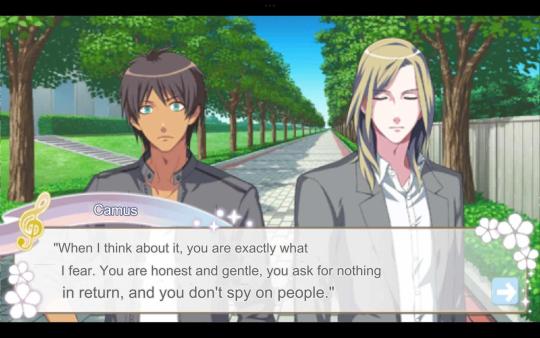
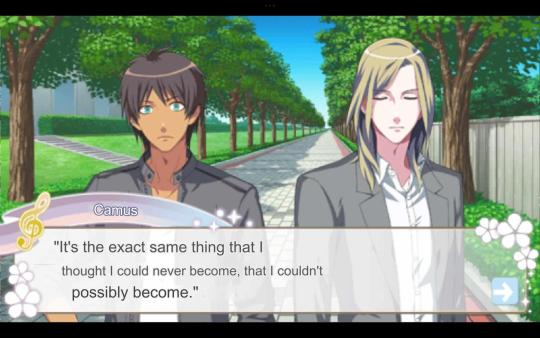
Season 2 does hint at something, so that's pretty cool!


Side note, I really love that his theme in the new Oracle series is "Change," the melting of ice.

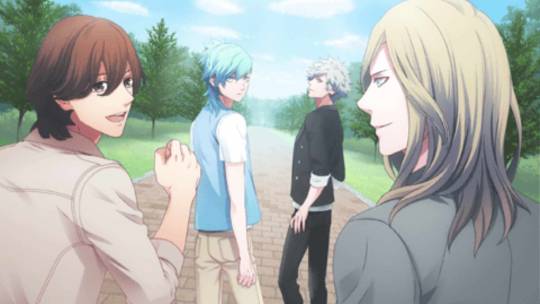
So what was the anime supposed to do??
Of course there's no way to show all this in a single episode or even during the runtime of the anime, and I never expected them to because the story is very surface-level (that goes for all characters).
It's just unfortunate since the anime is the most accessible and well-known utapri media in the western fandom, and the character's main episode is bound to leave the biggest impression.
I understand the choice of being laser-focused on the servant plotline, it's supposed to be funny (?) and waters him down to a trope that's easy to understand at first glance (the step-on-me guy I guess)
Still, I can't help but compare it to Ranmaru's episode, who was also hard to work with in the games but was chill in S3E7 and got to pet cats. Anime onlys will never know how much Camus loves to dote on his dog smh.....
#please don't take this too seriously#i just wanted to cry about camus#uta no prince sama#utapri#camus (utapri)#quartet night#cecil aijima#ranmaru kurosaki#reiji kotobuki#ai mikaze#tag for me yapping about utapri
96 notes
·
View notes
Note
just saw ur gale/mystra analysis post. im new to the game and dnd lore and honestly… ur take on their relationship feels like the most natural/compelling one??? esp since its all too easy to simplify topics that have many facets and nuance….
thanks for sharing i love analysis and reading people’s takes on narratives : D
My pleasure! (Bee from the future here: congrats, you spawned another meta!)
I love complicated characters, WAY more than I like a clear cut-and-dry case. Flaws, to me, are what make a character compelling and lead to interesting stories about them with choices that can get them into situations. I'm both writing a fanfic and running a campaign where I'm playing as Gale, and in the interest of portraying him properly and in-character, I've gone into SUCH a deep dive into all the decisions and facts that make him him.
It helps to, y'know, also be in love with the fictional wizard, but I digress
The thing about Baldur's Gate 3 is that no character in there is perfect. I've seen a couple analyses about the theme of continuing cycles of abuse vs breaking out of them, but in my mind, in terms of the characters themselves, it goes like this:
The origin characters have just come out of the lowest situation of their lives (Lae'zel being the exception; being tadpoled is a gith's worst nightmare. You're seeing that lowest situation in real time).
Not the lowest point, mind. Gale's lowest was probably the day after he got the Orb. Wyll's was probably the day his father cast him out. Karlach's was the day she lost her heart. But the lowest, accepted normal for them is what they've just left.
They're then thrown out of their depth and forced to rely on you to live. That's #1 priority: living. We get the extremes of these characters before we get their nuances, because they're quite literally at their breaking points.
Then once we get to know them, we see their wants, their hopes, their fears, as they open up to us. Every companion's story is at their own pace, but they all have a moment where they ping-pong between despondency and desire. Sometimes that desire is what we know isn't good for them, like Shadowheart wanting to be a Dark Justiciar. Sometimes that despondency is only for a flicker, like Astarion's realization that he's condemned 7000 people to a half-life of tortured spawnhood for as long as he's been a vampire.
Romance lets us crack all that open more, because if you pursue a romantic partner, they see you as their closest confidant. They WANT to trust you, so they're more willing to explain how they see the world and what decisions they want to chase.
And then their endings. Those often get simplified as good/bad, continuing the cycle vs breaking away from it. But how is Duke Wyll on the same platform as Ascended Astarion? He's not evil, he's not even entirely unhappy. He might even have broken out of his abusive cycle with Mizora, if you played your cards right. And Ascended Astarion is overjoyed, even if he is remarkably more cold.
I think that the endings are less a dichotomy of "this is good for them" vs "this is bad for them," and more one of "bringing out their best traits" vs "bringing out their worst."
Wyll's worst trait is being willing to sacrifice his own wants for whatever people desire of him. His best is standing for what he believes in and ensuring people are safe. Duke Wyll leans into that necessity to turn the other cheek in the name of people who count on him, while the Blade of Avernus has seized that moral compass of his and forged it out of mithral.
Shadowheart's worst trait is blind obedience at the cost of her individuality, while her best is her desire to be kind to things that don't deserve to be hurt. Mother Superior Shadowheart's whole life is defined by Shar. Selûnite Shadowheart's life is defined by her hospitality, especially towards animals.
Karlach's worst trait is how willing she is to accept that things are (to quote her) fucked, letting despair override hope. Her best is her durability in the face of horror. Exploded Karlach would rather die than try to work out a solution in the Hells, because she's terrified of facing Zariel alone. Mindflayer Karlach has accepted her fate and decides to give up her heart and soul to go out a hero, losing who she is. Fury of Avernus Karlach is willing to keep fighting for a solution, and by the time the epilogue happens, she's got her sights set on one.
Astarion's worst trait is his desire for power over people. His best trait is using the tools he has to his advantage. Ascended Astarion has let his powerhungry nature and paranoia lead all of his decisions, with his sights set on dominating mankind. Spawn Astarion has embraced what he is, and carved out a life for himself where he can do as he pleases.
Lae'zel's worst trait is her blind fanaticism, while her best trait is her individual dedication, making her loyalty a marriage of the two. Ascended Lae'zel is a meal for the lich queen, turning a blind eye to all Vlaakith's tried to do to her and literally being consumed by her fervor. Champion of Orpheus Lae'zel has turned her loyalty into something productive for diplomacy. Faerûnian Lae'zel has seized her individuality by the throat and decided her own future.
And then Gale. Gale's worst traits are his hubris and, paradoxically, his low self worth. His best traits are his creativity and wonder for the world. God Gale is the embodiment of ambition, having burned away all but that in pursuit of perfection. Exploded Gale has let his remorse blot out all hope for a redemption in which he does not die, because he thinks he's earned it. Professor Gale leads his life by embracing the school of Illusion and letting his creativity thrive, teaching others to do the same. House Husband Gale has multiple creative projects he's working on, and Adventurer Gale is always finding new sights to see and wanting to share them with you.
There are arguments to be made on which ending the origins are happiest in, certainly, or which one benefits them the most, but each ending represents the extreme of a facet they possess.
So with all that, there's a sort of malleable method to figuring out the ins and outs of a character.
You take their endings—all of them, all variables they can have—and reverse-engineer the flaws and details they carry. Then you start to notice how those work into their approvals for minor things: Astarion approving of your taking of the Blood of Lathander, or Shadowheart approving of standing up for Arabella. Getting a list of approvals and disapprovals is helpful, but having those endings on hand tells you why they react like that to a majority of their decisions.
You take their romance-route explanations of how they act, and apply those to earlier decisions. Astarion's confession to manipulating you and Araj-prompted admittance to using himself as a tool brings to light how he reacts to your decisions, regardless of his actual opinions on them. Wyll's fairytale romance and love of poetic adages speaks to his idealistic nature, and why he takes a sometimes-blinded approach to decisions in which the "right" answer isn't always the smart one.
You take their beginning reactions to stress and use that to measure how future decisions impact them. Lae'zel locks down and gets snappy when she's scared, while Gale immediately turns to diplomacy. Shadowheart has gallows humor, while Wyll turns to quiet acceptance. If they break from these and seem even worse, you know the situation is more dire in their minds than having seven days to live.
And then you factor in all their fun facts and dialogue choices and backstories.
A wizard falls in love with a goddess and her magic, attempts to retrieve a piece of her power for her, is scorned for his attempt and is cursed to die.
Give that backstory to a Tav. Look at how it changes.
A chaotic good wizard fell in love with a goddess, thought retrieving a piece of power for her would be a showy bouquet of love, and was punished for not thinking things through.
A lawful evil wizard fell in love with a goddess's power, snatched the most precious thing she owned, tried to use it to barter his way through to the secrets she kept, and was given a swift retribution.
Same backstory. Same class, same act, same goddess. Wildly different connotations. Wildly different conclusions as to who is in the wrong.
If you take all there is to Gale, all that the game shows us makes up his character, and apply it to this backstory, you get what really happened:
A wizard, enamored with magic, fell in love with a goddess. His desires led him to want more than she was willing to give. In his well-buried fear of inadequacy, he concluded that the reason she wouldn't indulge his ambitions was because he just hadn't proven himself worthy enough. So he tried to prove himself, but he lacked the context for what he was proving himself with. And the goddess, seeing a weapon that had killed her predecessor, saw this ambitious wizard as losing his way and coming for her just like the weapon's creator had. She was angry, she withdrew his link to her, and he didn't know why. So he drew the conclusion that she took his powers to punish him, and let that encompass his fall from grace.
Was he wrong to reach for what was out there?
If you knew that the answers to everything you cared about were not only known, but kept by someone you loved—someone who adored you—what would you do to ask to see them? What if your curiosities were if there were other planets with life out there, or how dark matter worked, or whether or not we could one day travel in the stars? What if it was the potential cure to an illness that's little-understood, or the way to make a program you dreamt up, or the scope of the true limits of your artistic talents? Would your answer change?
Was she wrong to cut him off?
If you were once hurt, and the person you loved—the person who adored you—brought the thing that caused it to your door, believing you'd want it, how would you react to seeing it? What if that thing was someone you thought you'd broken contact with, like a friend or family member you'd been trying to avoid? Would your answer change?
That's the sort of scope that needs to be applied to this, on both sides. You have to take the perspectives of each party, and apply two analogies instead of one.
Gale saw the vastness of the universe, untold wonders, the solution to every question he could ever dream up, and saw Mystra as withholding this from him because she thought he just wasn't worthy enough. To claim Mystra knew his perspective does her a disservice.
Mystra saw a cruel weapon she thought long gone, in the hands of someone who could use it, brought right to her, and thought Gale was willingly following the path of Karsus. To claim Gale knew her perspective does him a disservice.
Should Gale have researched his prize more, so he knew just what he was obtaining? Should he have kept his hands off a cursed book that would devour him? Of course he should have.
Should he have given up on chasing his dreams?
Should Mystra have understood that Gale's pursuit of power was nothing like Karsus'? Should she have communicated when she was angry instead of giving the cold shoulder? Of course she should have.
Should she have given him the benefit of the doubt?
That's the root of their falling out. That's what leads to hurt being inflicted. Understandable, human reactions to the situations they perceive. Unhealthy, unwise choices made afterwards.
You work backwards from this to figure out their dynamic as Chosen and goddess. You work forward from this to understand more of where Gale and Mystra are during the events of Baldur's Gate 3. Gale reached too high, and understands this. His goddess hates him, and he regrets this. Mystra isolated Gale, and understands this. Her Chosen wants redemption, and she wants to make it happen.
Just like we took Gale's character into account, we also have to take Mystra's.
A goddess is faced with a problem. She uses someone who's desperate for approval to solve it, by telling him to kill himself.
An evil goddess is faced with a threat to her reign. She sees someone who's unfailingly loyal and hates himself, and elects to have him tear himself apart rather than do anything about it.
A good goddess is terrified of the future. She sees someone who tried to hurt her, who's going to die anyways, and tells him to use it to save the world.
Same story. Same act, same power, same pawn. Different character. Different perspective. Different outlook on whether or not this is the right thing to do.
Mystra has died, multiple times, to people trying to stake claim to her domain. Someone appears with the very thing that could do it again, right as she's regained her stability.
She does not see mortals the way mortals do. She is timeless. She is eternal. She has a duty to protect billions of people, and one person lost to protect that number is more than worth the sacrifice.
People like to bring up the Seven Sisters as proof of Mystra's cruelty. For those unaware, Mystra asked permission to, then possessed, a woman, used her to court a man (with dubious consent from the woman), and bore seven children, all of whom were capable of bearing Mystra's power as Chosen without dying. The woman she possessed was killed in the process (reduced to no more than a husk, then slain by her now-husband, hoping to end her suffering), and the husband was horrified by the whole story.
Mystra needed Chosen in order to restore herself in the event that she was killed again, to prevent magic as a whole from collapsing and wreaking havoc on the mortal realm, like it had in the few seconds Mystryl had been dead. Elminster, Khelben Blackstaff, and the Seven Sisters contributed to this. The more Chosen she has, the better; what happens if Elminster dies? She can't afford to have all her eggs in one basket.
Mystra has Volo (yeah, that Volo) as a Weave Anchor, imparted with a portion of her power to prevent the Weave from shredding itself to pieces in her absence. All Chosen of Mystra are Weave Anchors by nature. The creation of Weave Anchors was mandated by Ao, the Overgod, and Chosen are the best way to make sure those anchors aren't drained by ambitious people hoping for godlike power. Chosen can, and will, defend themselves, unlike static locations (which Mystra also has). The anchors are why the Weave wasn't completely obliterated during Mystra's last death, when the Spellplague rose up, because they stabilized the Weave around them.
Everything Mystra does is in the name of the big picture, to prevent a catastrophe like the fall of Netheril from happening again. Her restriction of magic, her numerous Chosen, her creation of Weave Anchors, her destruction of those who would claim her power, it's all in the name of the stability she's been charged with. Dornal Silverhand's grief and Elué Silverhand's death, while regrettable, were worth it to bring seven more anchors into existence to save all of the Material.
So someone appears with the Crown of Karsus, potentially powerful enough to try to kill the other gods in the name of the Dead Three. She can't risk being a target of them. She can't risk the destruction of magic again.
Gale is going to die. He lives in fear. He begs for forgiveness.
In Mystra's eyes, she's offering him the best outcome. She'll let him die in service to her, to save Faerûn, and she'll forgive him. He's going to die anyways, and if he does this, she'll give him everything (she thinks) he could ever want in her realm. She's asking him to do what (she thinks) is the right thing.
"She would consider what she considers to be forgiveness."
Notably, she leaves the decision in his hands. She doesn't have Elminster lead him to the Nether Brain. She doesn't activate him as soon as he's there. When he lives yet, she doesn't revoke the charm that keeps him stable. And when he declines, when he lets it go and starts pursuing Karsus' path, she doesn't smite him on the spot.
She is (she thinks) being incredibly patient. If Gale is going to try to be Karsus II, she's ready for him. If he decides to walk off and keep the Orb, he's dug his own grave in the Fugue Plane (those who don't have a god to claim them roam endlessly as husks and form a wall of bodies around the City of Judgement).
From her perspective, she's not being unreasonable. But from the perspective of a mortal, she absolutely is.
"Now, I have a question for thee: what is the worth of a single mortal's life?"
This is a question she cannot answer properly.
I think a lot of characterization is lost whenever someone paints one of them as being totally in the right. But I also think you have to be invested in them as characters to want to see that characterization. If you want to write about Mystra, you have to try to get into her head, analyze the decisions she made, figure out why she thinks she was right, and follow the pattern.
Gale's sacrifice is a very predictable thing for her to ask for.
#bg3#gale dekarios#gale of waterdeep#mystra#long post#like really long post holy hells#did not expect this to go on for this long#swearing tw#< for karlach#oh yeah#astarion#karlach#wyll ravengard#shadowheart#lae'zel#ask bee
310 notes
·
View notes
Text
Spent today checking out The Amazing Digital Circus and Murder Drones, and god, the kids today have it so good when it comes to this sort of content. When I was a teen, I was obsessed with Red vs. Blue and RWBY, which I think it's fair to say are the equivalents of the time, and the sheer gulf in terms of writing quality and production value is stunning. I hear there were some rumblings of unprofessional conduct from the production company, which would hardly be surprising considering this is yet another guys-working-from-their-basement success story, but much bigger companies with much shittier business practises consistently put out much worse content than this.
The Amazing Digital Circus is definitely the better show of the two, thanks to its slam-dunk premise and some great writing from Gooseworx. The producers have talked about aiming to fill a perceived gap in the market between kids' cartoons (The Boss Baby) and adult animation (Bojack Horseman), and I think they have successfully threaded the needle to create a very unique tone. There's a sense of these works existing totally outside the mainstream media machine; they're not getting BBFC rated, but you just know millions of kids are watching them. It's on YouTube and the fact that it looks like some Frozen Spider-Man kids' slop just means da parents won't question what their kids are watching.
But truth be told, there's nothing objectionable about the content of The Amazing Digital Circus whatsoever. It's unusually metatextual and loosely apes the aesthetics of much darker media, touching on slightly more existential themes than your typical kids' cartoon, but it still has a lot in common with those same cartoons. The zany characters are all fairly one-note, and the emotional arcs of the episodes are honestly quite straightforward. The second episode in particular has an absolutely textbook plot structure to it. It's a far more self-assured and traditional style of writing than you ever see in this kind of independent work—certainly far more so than Murder Drones, which is written by an insane person.
More than anything, I'm reminded of how I felt watching Puella Magi Madoka Magica: that it's a very solid work of fiction, but that the people who'd get the most out of the work are isolated teens struggling to make the transition into adulthood. Certainly if nothing else, the fandoms of these shows must be bringing a lot of kids together around the world. I adore this soundbite from Goose: "Above anything else, I just wanted it to feel kind of lonely." You see Pomni's worldview shatter, she suddenly finds herself in a body that feels completely wrong, and she has to construct a new kind of belonging for herself.
As for Murder Drones, that show's absolutely fucking nuts, yo. The writing is at once painfully basic and utterly incomprehensible. If someone just sat down and explained the plot straightforwardly, it would be fantastically boring. But man, the presentation, the sheer delight the animators seem to approach every scene with...! I'd say it's clearly trying to use "the characters are robots" as an excuse to expose da kids to some absolutely shocking levels of gore, much like the Transformers movies, but midway through the series it starts straightup swapping the oil and wires for blood and bones and you've got to respect that.
The writing itself is so excruciatingly irony-poisoned that it goes beyond cringe and somehow wraps back around again to being sincerely funny. The show kind of wants to have its cake and eat it in terms of constantly lampshading how flat and cliché the emotional plotting is, but also clearly aiming to genuinely tug at the heartstrings and whip fans into a frenzy. And it kind of succeeds, I think! The way it veers between bizarrely high-effort implementations of memes, seriously cool fight scenes and horror visuals, and big emotional moments is very disarming. If The Amazing Digital Circus is an attempt to faithfully rework the American-cartoon formula for a slightly older audience, Murder Drones aims to crib the aesthetics of high-school cartoons while actively rejecting every traditional narrative technique used in those stories. Which means it's kind of bad, which means it's also kind of great.
If it's not already, then within a couple of years it will be deeply cringe to have ever been into Murder Drones in particular or (to a slightly lesser extent) The Amazing Digital Circus, in much the same way that everyone seems embarrassed to admit they were ever a Homestuck fan. But like with Homestuck, I feel like these series are genuinely pushing at the frontiers of storytelling in a way that's commendable and might inspire new kinds of writing once the fans grow up.
ENA is also pretty good, for the record.
135 notes
·
View notes
Text
Notable Details from the original "Into The Pit" story (PART 1)
Upon the mill's closure, Oswald's dad works part-time at the deli counter in a store called the Snack Space (a 7-11 equivalent, basically), which requires a red vest as their uniform. Oswald is embarrassed by the fact his dad is wearing the vest as he drops him off at school. Just a neat bit of world-building.
Oswald has a best friend named Ben who moved into the next town over.
Oswald's bullies, including Dylan Cooper, call him "Oswald the Ocelot" after a cartoon character they saw as pre-schoolers, a big pink ocelot named Oswald. Again, more world-building.
Oswald is described as having freckles and a cowlick in the original story.
Oswald has no modern electronics in his home, save for one laptop he shares with his family. His phone is an outdated model he's embarrassed by.
Oswald's teacher, Mrs. Meecham, puts on a movie for her class on the last day of school, which is described as "about a farm with talking animals", "too babyish for a roomful of fifth graders". I'm guessing they might have been watching the animated adaptation of Charlotte's Web... or it could be wishful thinking on my part, since I love that movie.
Oswald has been drawing mechanical animals ("bears, bunnies, and birds") for reasons even he doesn't know, other than lack of anything better to do when he's bored.
Oswald's mom works at the hospital from 12PM to 12AM... yikes.
Oswald's dad can't cook to save his life. If it can't be boiled in water or heated in a microwave, he has to buy his meals... how relatable.
Blue-box macaroni and cheese exists in FNAF, meaning Kraft and its products likely exist, too. Just thought that was funny for some reason.
Oswald's dad squirts ketchup into his mac and cheese. I just think knowing he's the kind of dad who does that is really funny... kinda reminds me of my stepdad's love of ketchup, to be honest.
Other pizzerias that once existed in Oswald's town were Gino's Pizza and Marco's Pizza, both of which closed not long after the mill closed. Both Gino's and Marco's are described as good restaurants, while the food at Jeff's Pizza is described as "decent".
Oswald is into B-grade Japanese horror films, including kaiju movies like Zendrelix vs. Mechazendrelix. Zendrelix is apparently FNAF's answer to Godzilla, making Mechazendrelix an equivalent to Mechagodzilla. They're described like this: "... Zendrelix just looked like a giant dragon thing, but Mechazendrelix reminded him [Oswald] of the mechanical animals he drew when he stripped them of their fur." Zendrelix is also described as being portrayed by "a guy in a rubber suit", solidifying the connection between him and Godzilla.
Oswald and his dad both really love bacon. I just thought that was cute.
When Oswald visits the library, a place he finds "actually kinda fun", he shows interest in a science fiction book from a series, as well as a manga he liked. Based, IMHO.
The library Oswald visits frequently allows homeless people to use their computers and other resources. WE NEED LIBRARIES AND THIS IS EXACTLY ONE REASON WHY!
Oswald's mom, being a nurse, is a bit of a germaphobe and won't let Oswald play in places she considers dirty. A ball pit would be considered one such place.
The pizza Jeff serves comes in huge slices too big for the paper plates they're served on, and very greasy. As someone who was born in NYC and used to eat greasy New York pizza... I think I would have liked eating at Jeff's. Maybe.
Oswald reads a library book while visiting Jeff's Pizza, about "a world where kids with secret powers went to a special school to learn how to fight evil". I wonder how many books that describes...
Oswald plays an online fantasy game at the library that's free to play, but Oswald gets to a point where he can't progress without money. I wonder what game it could have been...
Oswald's dad and mom used to date in high school, often frequenting a roller rink, and are great skaters as a result. Oswald himself can't skate and needs his parents to hold him up.
Oswald's dad only ever buys vanilla ice cream.
There's a video rental service Oswald's family uses called Red Box, but I don't know if it's meant to be the same as the actual existing Redbox. Maybe it is?
Oswald's mom is very good at playing Clue... oh, and Clue exists in the FNAF universe.
Oswald's dad prefers practical effects over CGI in movies. Oswald is the exact opposite.
Oswald's dad is a fan of country music. Oswald... is not.
#fnaf#fnaf into the pit#fnaf oswald#fnaf oswald's dad#fnaf oswald's mom#fnaf jeff#fnaf itp#fnaf fazbear frights#fazbear frights#into the pit#world building
114 notes
·
View notes
Text
MOVIES ON YOUTUBE
Cats Don't Dance
The Borrowers
Osmosis Jones
Bratz Live Action Movie
Judy Moody and the Not Bummer Summer
Ugly Dolls
Old/B Horror Movies (scary warning)
Maya the Bee Movie
Sailor Moon S the Movie
Sailor Moon SuperS the Movie
Alpha & Omega: Journey to Bear Kingdom
Anastasia
Snow White
A Stork's Journey
The Ant Bully
Quackerz
Uncle P
I Am T-Rex
The Clique
Hoot
Pixies
Dan Vs. - The Wolf-Man
The Breadwinner
Just My Luck
Penelope
Twilight Zone: The Movie
Daisies (1966) (one of my favourite art films from Czechoslovakia in the pre-soviet era)
Into the Woods (2014)
Fantastic Mr. Fox
Sailor Moon (Original Japanese)
The Carol Burnett Show
Popeye Cartoon
Naruto (English Subtitled) (Subbed)
H2O: Just Add Water
The Dick Van Dyke Show
Hunter x Hunter (Subbed) (Subbed)
Ghostbusters
The Neverending Story
It Takes Two
Peanuts: Race for Your Life Charlie Brown
Thunder And The House Of Magic
Quest for Camelot
Adventures Of Shark Boy And Lava Girl
Arthur's Missing Pal
Ghost Hunters International
The Big Comfy Couch
Me, Eloise!
Kitchen Nightmares
Wow! Wow! Wubbzy
Death Note (Subbed) (Subbed)
Candid Camera
Flash Gordon
Street Fighter - The Animated Series
Hell's Kitchen
Captain Simian & the Space Monkeys
Hello Kitty
The Storyteller
The Weird Al Show
Treehouse Masters
Inuyasha (Subbed) (Subbed)
Care Bears: Grizzle-ly Adventures
Wow, I Never Knew That!
Are You Smarter Than A Fifth Grader
Bruno & The Banana Bunch
Care Bears: Welcome to Care-A-Lot
Beyond Belief: Fact or Fiction
Patchwork Pals
ALF
Storm Chasers
Little Rascals Shorts
The Lone Ranger
All Dogs Go To Heaven
Baby Einstein Classics
Baby Einstein: The Sandbox

#agere class#agere classroom#agere daycare#agere school#agere#age regression#sfw agere#sfw littlespace#age regressor#sfw age regression#agereg#age dreaming#sfw little blog#agere blog#Ciao lovelies#Agere diys#Agere diy#Agere craft#Agere crafts
110 notes
·
View notes
Text
Uraume Confirmed Gender, Originally a Male and Reincarnated Into a Woman's Body | Jujutsu Kaisen Volume 28
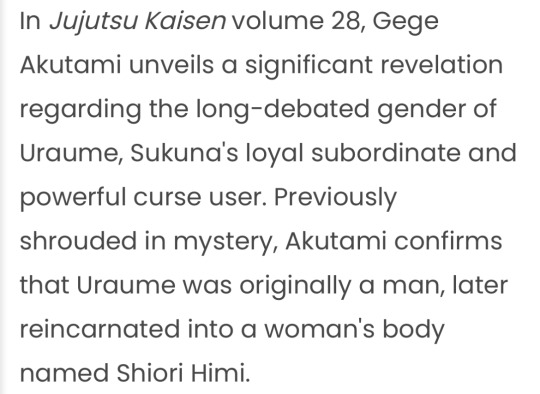
[Source: SportsSkeeda Article]
Okay first off, let me just say that I fucking knew it. Usually, I try not to make jokes while writing these silly, for lack of a better word; essays. However, I did in fact call it. I theorized this is exactly how Uraume's gender works, the binding on their chest never being for battle, but instead just to bind their chest. Here's a screenshot dating back to September 10th [last month]

Now excuse me but to all the Jujutsu Kaisen "fans" that said Uraume is in fact a girl and nothing else; FUCK YOU.
I'm sorry but the jjk fandom is by far one of the worst fandoms I've been in. and I've been in the My Hero Academia fandom so that says A LOT.
it's extremely ironic too because as soon as this came out, the "transphobic" Uraume "fans" stopped shipping them with Sukuna, like immediately. If that doesn't scream red flags about the fandom then I don't know what does.
I've talked about it before and I will talk about it again, [legal + nontoxic] queer ships and queer headcanons within the jjk fandom is NOT the problem. The people constantly shoving "why can't two men be best friends" down your throat are THE problem. These headcanons and ships are not new within any anime fandom, there will always be a queer ship no matter what.
"Why can't two men be best friends" Why can't a woman and a man be best friends? Why do you ship every woman + man friendship?
Honestly the first time I've ever been so goddamn happy for Gege Akutami to confirm something about his character, especially knowing who it's going to upset. It honestly does suck how many bigots are in the jjk fandom because Gege isn't against lgbtqia+, he's literally a fan of BLs..
The only excuses people had for Uraume being a woman is;
Hakari calling them a 'her' [he was assuming]
Uraume has bandages around their chest during Hakari vs Uraume because they're a woman and that's what women do during battles
They were reincarnated into a woman's body therefore they're a woman.
I'm skipping over the Hakari part because that is such an obvious answer. Uraume having a chest binding around their chest during a fight isn't because they're a woman, not to mention no other woman character has ever had chest bindings, there's literally nothing to back that up. And if you *actually* paid attention in Jujutsu Kaisen, you'd know that reincarnation has NEVER specified that the vessel NEEDED to be of the SAME GENDER.
I'm not 'caring too much' about a fictional situation. I care about the fact that homo/transphobes are so fucking annoying in fandoms to the point that no one can even enjoy Jujutsu Kaisen anymore without some rat in your ear saying it's not canon.
Just like the heavy homophobia towards SatoSugu or ItaFushi, the only excuse both have is 'two men can be best friends' as if SatoSugu or ItaFushi shippers have ever said they couldn't be. The more valid reason is that ItaFushi is a risky ship due to both of them being minors and not wanting two minor characters to be sexualized, but shipping characters doesn't automatically mean you want them to have intercourse or debate on who's top/bottom.
Most shippers [including myself] ship characters that would most likely be wholesome together due to how much they care about each other.
Anyway, I thank Gege Akutami for this confirmation so the useless debate can stop. I will still be referring to Uraume as 'they/them' due to them being technically both genders. I'm praying that the Jujutsu Kaisen fandom and future fandoms are able to heal and not have constant debates like this because people want to have unproblematic headcanons.
#jjk#jujutsu kaisen#jjk 0#jjk sukuna#sukuna#ryomen sukuna#sukuna true form#true form sukuna#jjk uraume#uraume#jujutsu uraume#blobkuna#sukuna x uraume#lighthearted#lol#erm what the sigma#lolz#trending#jjk volume 28#jjk gojo#gojo satoru#jjk geto#jjk satosugu#satosugu#jjk itafushi#itafushi
62 notes
·
View notes
Text
I had to make a whole google doc to sort my thoughts on this, that's how mad I am tbh. My friends have made explanations which you can find here, and here. And while I told myself that after that post I was done, seeing my friend receive a comment like this was the final pushing point I needed.
I'm both going to ramble about Nezha here again, and I'm going to try and explain this in a way that'll get people to understand, as someone who once followed an Eastern religion too + I'm going to be stating my basic thoughts here so maybe some things won't make sense.
Mild info about me: I'm from Trinidad. My family is described with East Indian descent but clearly, I'm not from India itself. My knowledge of Hinduism is rather basic because I quit religion thanks to traumatic experiences related to it, however not lacking fully. From my father's side, specifically his mother, they practice Hinduism and can even be considered devout Hindus (if I'm to believe all the statues and pictures of about almost every single Hindu god). Though my knowledge is basic, understand that I'm not Hindu nor Indian, so of course these are my opinions and my experiences with Hinduism, and I do not advise you taking my word fully to heart. I'm only trying to explain something to the LMK fandom in the best way I know how too, by referencing another Eastern religion that isn't half as popular as Daoism/Buddhism.
There's only one show I know where Hinduism is portrayed, and it's an anime/manga series called Record Of Ragnarok (Shuumatsu No Valkyrie), and from what I know it's not well liked by others (and even banned I think?) because of the fact Shiva is weaker than Zeus and the supposed sexualization of Parvati, Kali and Durga? It's been a while so I could be wrong on this though.
Why am I bringing this topic up to a rant about a lego character though?
#1) Fiction vs Religion and Reality
While one half expresses discontent and discomfort, I've seen others who clearly don't mind because Shiva is still badass and cool. I myself had some qualms about his appearance in the beginning because while I did quit religion, this was a god I used to worship, and seeing him in an anime/manga and be sexualized and simped for was…uncanny, to say the least. Overtime I grew numb to it though because it was genuinely funny and even I, an ex Hindu, found him attractive, and had not much hesitation writing smut about him in past fics.
Similarly, I can imagine this is how Daoists and Chinese had originally felt about Nezha in Lego Monkie Kid [Only referencing LMK with Chinese deities. I'm aware there could be other media where they're in.] A bit weird at first but then overall got used to it because there's genuinely no harm done, as it's not meant to be an educational retelling of a god, but a fictional portrayal of him.
Returning to the point I mentioned with Shiva. When I first came across this series in 2021 (?), I did not feel too happy and comfortable with the image of a deity I've grown up worshipping as a child. I quit religion when I turned 13, so it's been nearly five years since I've had nothing to do with the main religion of my household; Hinduism. Still, I practically grew up worshipping this god I was taught to fear, and seeing a potrayal of him (which honestly in my opinion) didn't seem like a good thing at the time.
Why did I eventually stop being bothered? Because this wasn't supposed to be retelling of Shiva. This was just a character with similarities to the god I worshipped, but wasn't the god. The series I watched wasn't even intending to teach audiences about any of the religions and real life figures they portrayed, they simply used them as inspiration to tell a story. They weren't accurate representations, but that was the point. It's a story about gods vs humans from history; of course it wasn't going to be accurate nor stay true to the figure they took inspiration from.
You can imagine then for a cartoon series meant to sell Legos. Lego Monkie Kid contains several characters that are known in Chinese myths and legends/religions. Of the most popular mentioned, there is Sun Wukong, one of the main characters in the series, Tang Sanzang otherwise known as Tripitaka and the Great Monk, Lady Guanyin mentioned in season 1, the one the fandom argues about, Nezha, the Jade Emperor in season 4, and most recently, Nuwa, and Heavenly Pagoda King, Li Jing. There may be others but these are the ones that are most known within the fandom.
Mind you some of these figures are still very much worshipped now, but, point remains: the series was never intended to be a retelling of these characters stories, nor were they intended to be educational for audiences. They took inspiration directly, gave their own twists, and hence you have the story of LMK, meant to originally promote Legos and then eventually gave way to the series that this fandom belongs too.
These characters are not their source material, nor the origins of which they came from as religious figures. Sun Wukong is a Buddha within JTTW’s ends and if I'm right is still worshipped as such sometimes (?). He didn't hide away into a mountain at the end of his journey. His companions didn't die, nor were they reincarnated, but instead also acquired titles and became Buddhas as well. (Or gods? I frankly don't remember). Tang Sanzang as we've in season 4 was not some sort of brave, astute man in the book but rather a crybaby coward. Need I even point out that Nezha wouldn't have a giant mech to fight people, nor would he have such close deposition with the Jade Emperor? Or the fact that the Jade Emperor would be bested by someone like Azure Lion?
Not even counting Journey To The West and the Fengshen Yanyi, the real Tang Sanzang that Wu Cheng’en took inspiration of most certainly did not have a monkey, a pig, a water demon and a dragon turned horse with him on his journey.
Why speak of all this?
To make my first point; religion and fiction are two very different things. Religion has existed for who knows how long, and fiction has recently decided to include fictional potrayals of these gods into stories and cartoons. From a writer's perspective, it's really interesting taking something that is a part of religion and writing it into your own works, with your own take on it.
And of course, brings me to the topic of Nezha.
Lego Monkie Kid Nezha is, according to an official writer within the show's team, an adult. Although many fans have their objections about this, supposedly because Nezha in other sources is a child god, and think that the writer only abruptly pointed out Nezha's an adult to save her own skin.
Taking all my points in consideration; let me humour the Nezha is a child god idea. What, exactly, does this have to do with Nezha in Monkie Kid?
If Nezha, the god within Daoism and Buddhism, is supposedly a child deity, what law says that any other potryal of Nezha has to abide by this?
By this logic. Shiva in the anime I mentioned above shouldn't be weaker than Zeus. He also shouldn't even be agreeing to fight mortals, as he's a deity far above such petty behavior. Zeus shouldn't be portrayed in books like PJO as a lecherous cheater, because in reality, Ancient Greece consisted of multiple kingdoms and thereby different interpretations of Zeus were merged together which is what consists of the myths we know of him today which is highly disrespectful, and Sun Wukong shouldn't be a mentor to MK, because he's supposed to be a Buddhist, and thereby wouldn't be entertaining fighting nuances.
Fiction doesn't not adhere to reality. The fact I need to say this astounds me because should this not be obvious? Lego Monkie Kid is a cartoon set in some sci-fi futuristic world with lego people walking around, where gods somehow need mechs to go around fighting, and there are animal-like demons/yaoguai walking around here and there. There is literally an arcade in the show with zero gravity. Do you possibly believe for a miniscule second that anything that goes down in a fictional setting will adhere to our reality??
And, even then, humouring the Nezha being a child deity concept > what law says that he has to be portrayed as a child in other pieces of fiction?? Especially when the fictional setting is not meant to be a retelling or for educational purposes, but rather to carry a plot.
There is nothing, no law, no rules that insists that a religious figure must be portrayed as they are in a legend/myth for a fictional world.
Lego Monkie Kid Nezha is not the deity Nezha. He is a completely different character, which many of you should have realized from the exact moment he was brought into the show. They are not the same person. Never was.
“Oh, it's disrespectful―” From a writer's perspective, I personally don't think so. If I wanted to make a story that involved a god, I wouldn't keep everything that makes that god who they are. There are some key points I would keep to make the story, but I would ultimately create an OC that shares some attributes to this religious figure, but it wouldn't be him. The show Record of Ragnarok does a good job with this in my opinion, because while many characters share some attributes to the real figures they're inspired by, the writers changed several things to create a proper story, and thereby making these characters OCs and not the actual gods themselves, and of course that logic applies to Lego Monkie Kid.
In the instance, again, Nezha the god from Daoism, is in fact a child deity, Nezha in LMK isn't. Nezha in LMK is someone who's entirely different from the god himself.
So, the logic this fandom uses confuses me a lot. Do you not understand how to seperate fiction from religion?? Do many of you not understand media literacy, and what a writing process is like?
Sigh. Moving to another point―
#2) Character Designs
Sometimes, when it comes to character designs, anyone could just throw them into anything and think, “Yeah that's good.” Not much thought is given to a character's appearances depending, which I don't really blame as someone who's 1) done literature as a hobby and has seen my fair share of character designs, 2) creates characters myself. It's too hard thinking of a character's appearance, and even then when making them there normally wouldn't be any significance.
Nezha's design in LMK seems to be a huge source of debate when arguing about his age. It was actually brought up in my previous post, specifically that his hairstyle was often used by children at the time.
I have a bone to pick with this point.
This is Nezha from Lego Monkie Kid:
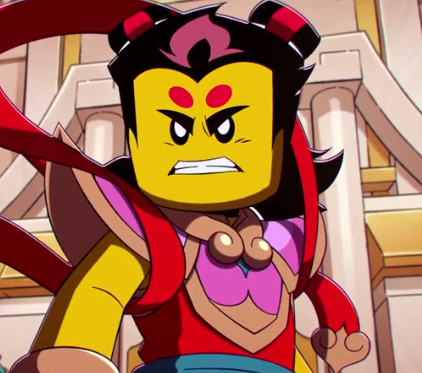
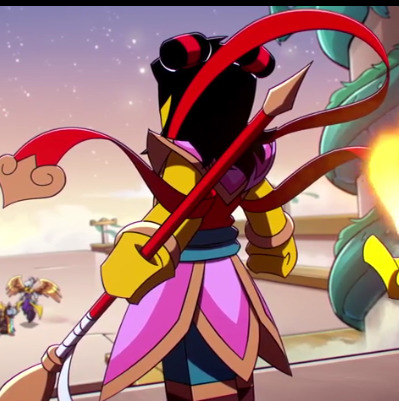
However, this is Mei from the same show:
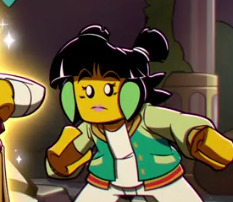
Before anyone starts, allow me to point out as a history geek that likes religion and pointless facts over politics: I am aware that there are different hairstyles to show certain things, including one's age and status and sometimes even personality. Do not bring up any points about the differences in these characters hairstyles with an excuse, “Oh, but you should know―”, because I know how hairstyles could be treated within history.
However. Look at Nezha's hairstyle, and then Mei's. I've never seen the LMK fandom complain about Mei's age, because it was generally believed that MK and Mei are both at least 18 if not older, as the legal age for a driver's license in China is 18.
Both Nezha and Mei are wearing a ‘bun’ type hairstyle. Mei's is arguably more of twin ponytails (?), but I'm not a hairstylist, so I don't know what they're called. To me they look similar, that's all I'm trying to say. And even if they weren't though―through a modern lense, a hairstyle isn't reserved for just any specific age. Anyone can wear a hairstyle they want. Keep in mind that the creators of LMK are also Western(?), and they chose a hairstyle for these two characters based on personality and appearances.
A hairstyle is not reserved for any age. Grown women including my aunts have worn hairstyles similar to these just for fun.
That's point one.
Point two; Nezha is a very popular deity, much like Sun Wukong. In terms of recognition, Sun Wukong is very easy to recognize because of his staff and his overall cocky personality.
Nezha however is an entirely different case. Most media potrayals of him always has the two-bun hairstyle of him, which is what makes Nezha recognizable. If you remove that specific hairstyle of his, you won't recognize him. It's iconic, and pointed out in this scene (The Legend of Hei) where Nezha makes an appearance as well.
youtube
[Characters sitting together. White haired boy (Hei + MC) looks at the older, dark haired boy (Nezha). Nezha looks back.]
Nezha: What? You want an autograph?
Hei: You're a boy?
Nezha: Yeah?
Hei: Your hairstyle is cute.
[Nezha looks in front with an annoyed expression.]
Nezha: If it weren't for the recognizability, I'd have changed it long ago.
Hei: Recognizability?
[Nezha removes the buns(? some form of them?) from his head. Three older figures glance at him.]
???: Who are you?
[Scene returns]
Nezha: See?
Aka, point being made: those buns are what makes Nezha recognizable. If he doesn't have that hairstyle, unless it's specifically pointed out, I'm certain majority would not recognize him.
Some hairstyles are meant to be done for some form of meaning. But sometimes, as is the case with designs, they're just there just because no one wanted to make the characters bald. Using the excuse about Nezha's hairstyle to justify his age as a child is by far the lamest and dumbest excuse I've ever heard of, because the creators did not give him that hairstyle for the sake of some meaning anymore than MK was given his current hairstyle either. It's his logo at this point, ignoring his color scheme aside.
Even then, if the creators of Lego Monkie Kid intended for Nezha to be a child within the show, he would not appear as he is. Lego Monkie Kid has made children models, which we can see here (used from s3 and up in case someone tries to excuse the differences in seasons):
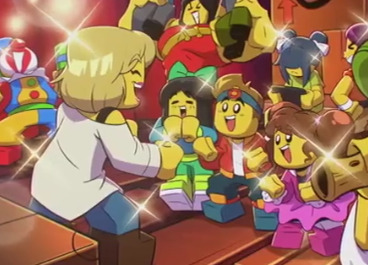
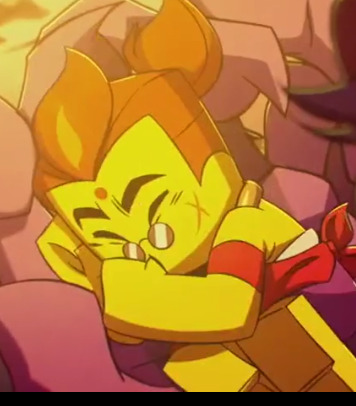
And of course, Nezha's model;
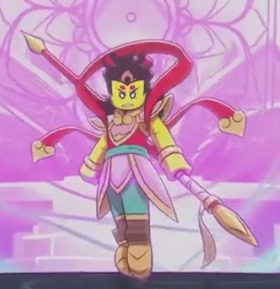
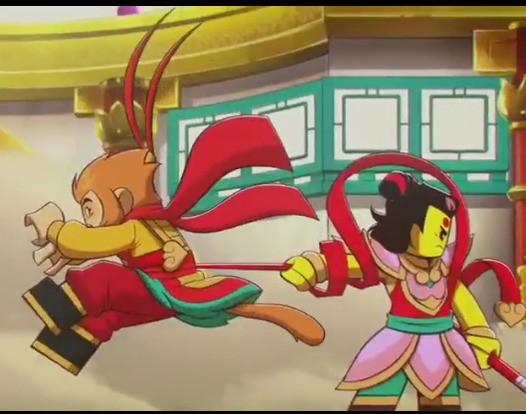
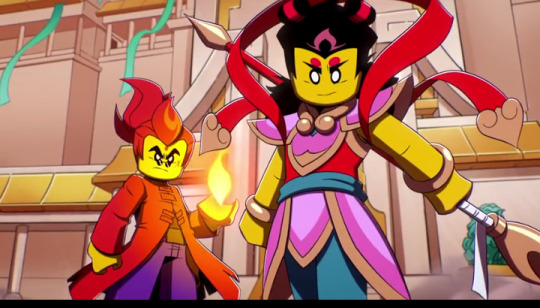
Despite the perspective and low quality though, he's at least the same height as Red Son here:

If Lego Monkie Kid truly intended for Nezha to be a child, his appearance and model would be similar to the children's in the show. Perspective is difficult to find but you can clearly see he's about the same height as the other adult characters if not taller, and is not small like the child figures we see.
Pink isn't a children's color, and nothing about Nezha's clothing indicates a child. He very much looks like an adult and doesn't exhibit childish behavior as we see Red Son, Mei and MK do.
I've seen fans use his voice to point out he's an adult, but I'm not sure that's a valid point. I say this as someone who has a 13 year old brother and was recently a minor myself.
Allow me to clarify: a voice isn't a clear proof of age. My father is a 45 year old man but sounds very much like a woman/teenage girl. My brother is 13 and sounds more of an adult than his father. My classmate in highschool was one year older than me and his voice was very high-pitched.
The voice actors in LMK are directed to speak a certain way for a reason…in English. I'm not sure about Mandarin. In my opinion, Wukong's voice sounds like Son Goku's because it's a reference to the fact Wukong is what inspired Goku. Nezha's probably sounds deep and brooding not because he's a child but because it almost represents his own personality, and probably is a reference from another shonen protagonist Ichigo Kurosaki. MK's voice in the beginning sounds really childish to me but slowly as the events of s3, 4 and 5 happen it gets more deeper almost as a reference to show how his ‘innocence’ is slowly fading.
Or, I might be looking to into it. Regardless, tdlr, don't use Nezha's voice in your argument. I've seen grown ass men have high pitched voices.
Returning to my original point however; if you have an ounce of media literacy and understanding, you should be aware that some character designs are chosen for a reason. Nezha's icon is those two bun hairstyle, and the writers purposely chose it so old fans/readers of JTTW and FSYY and maybe other Chinese/Daoists would be able to recognize him and go, “Hey, that's Nezha from―”
Before I got into LMK, I read JTTW and also saw The Legend of Hei and the Nezha 2019 movie, so I knew him because of the hairstyle. And my first instinct of course was to point out, “That's the dude from TLOH!!” when I saw him. So, the hairstyle was chosen for the recognizability, and I highly doubt as a sign of age.
Even then, LMK Nezha aside, moving on to a different point.
#3) Sources Of Inspiration
The 21st century isn't really the first era where people are taking inspiration from other cultures. As a matter of fact, it's been happening for decades, and it's very prominent in religion, which someone of you would know if you both a) actually did proper research, b) gave a shit about what you're researching and c) studied history.
Hilariously, I have done all three of the above.
I'm going to use a popular example here with Sun Wukong and Hanuman. Hinduism is supposedly largely considered one of the oldest religions in the world. If you truly think about it, certain Daoist deities are loosely inspired or are versions of Hindu gods, which I'm going to use here with a popular example (and provide a link too).
― Sun Wukong and Hanuman. The earliest Vedic records mention one of the supposed known monkey gods, and their similarities make scholars suggest Hanuman inspired Sun Wukong. Specifically his figure in JTTW, where it's speculated that the author must've had a copy of Vedic (?) hymns. While Sun Wukong does predate JTTW, Hanuman definitely has had some influence on him.
Much, much similarly, the deity known as Nezha, is also loosely inspired/based off the figure known as Nalakuvara, who appears in Hindu and Buddhist mythology, and often appears as a sexual trickster figure in Hindu and Buddhist literature.
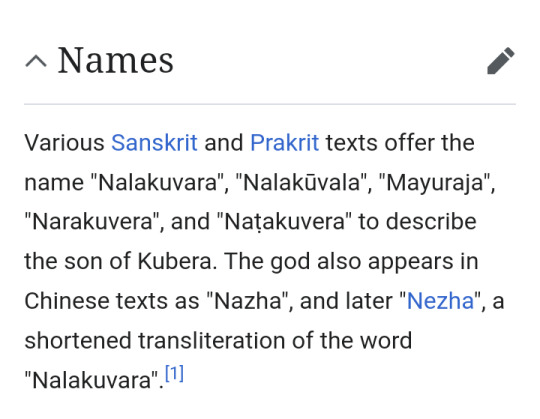
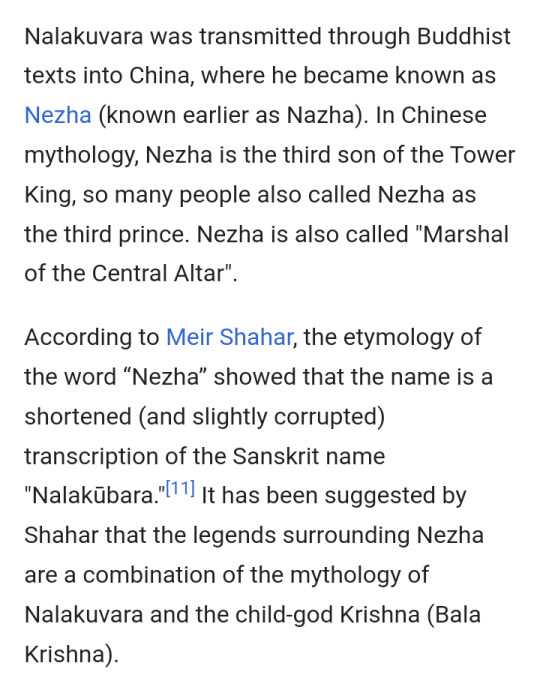
Historically speaking, when it comes to religion and myths, something many people fail to understand is that before there was the idea of writing to tell a story, there was the process known as sharing from mouth to ear. Not in a literal sense, but rather that people often preferred to tell stories via word of mouth back then, and as things always go in history, there will be changes. The proof is literally right there. Nezha was originally known as Nalakuvara, yet when transmitted through Buddhist texts, he became known as Nazha, then Nezha. And as such, the Lotus Prince and Chinese god known as Nezha was created. A combination of Nalakuvara and the child god Krishna.
A lot of people will want to jump on that specific point that mentions Krishna being a child god, so allow me to immediately put you down right there.
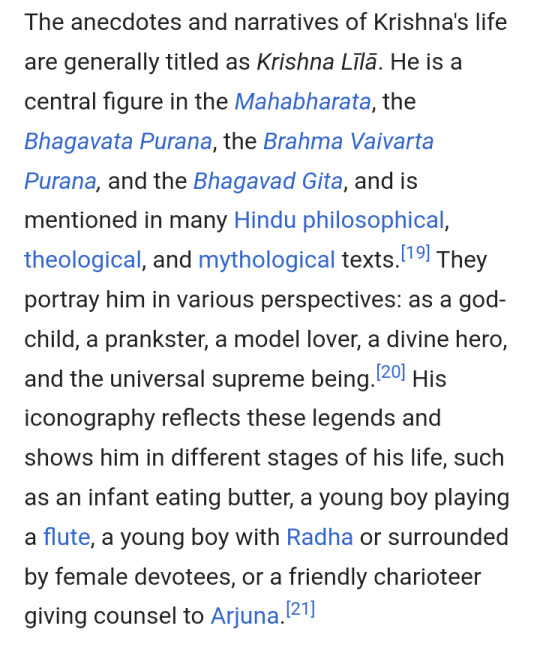
Ex Hindu here; I did not even know there was a portrayal of Krishna as a child. Up until I stopped practicing Hinduism, I used to worship Krishna as an adult figure. In the paintings and statues my aunts had for Diwali as a child, he was always showcased as an adult.
Ironically, doesn't this apply for the actual god Nezha too?
When it comes to religion and myths, many of you forget something very important; there is no such thing as a canon iteration. These aren't shows, these are stories from the past told through different people, and passed through many hands. There is no such thing as a canon version because almost everyone had their own version of a myth or story. Terms you may typically apply to fandoms don't apply to fucking religions and myths, and some of you are so chronically online that you forget it.
#4) The LMK Fandom's Chronically Online Attitude
I'm an ex Hindu who still faintly remembers some bits and pieces from my childhood while practicing this religion, especially during the Diwali period, where little me managed to get new information from library books about the gods my family worshipped. I personally didn't like sitting during the priest's (forgot what he was called) chanting though but the funny white thingy we used to have to wear was fun.
There are some Hindu gods I'm familiar with, like Lakshmi, Kali, Durga and the other versions of her (I still can't recover from the one statue with her in a fish..) Parvati, Shiva, Vishnu, Hanuman (yaah), Rama and Sita, Ganesh (also yah) and of course, Krishna. I also have watched my fair share of childhood movies and cartoons where the gods were mentioned or present―Karan & Arjun specifically struck the fear in me with Kali 😭😭 holy fuck that movie scared me with the creepy edits jeez T-T. There was also that one cartoon about Rama and Sita”s story specifically Hanuman, and this Indian TV series where this little girl was a loyal devotee to Ganesha (I had no idea rats were one of his uh signature animals holy shit).
I'm rambling here a bit because the childhood memories were fun, but the point I'm going for is though….
I am familiar with these gods I grew up with. And I know about them, maybe not enough but certainly enough to know how to properly respect them from back then.
And, using Krishna as a prime example; if someone came up to me, or I came across anyone, who argues that the god I know is an immortal child, even though I have worshipped and adult version of him, I'd be so fucking pissed. Krishna is seen as an adult, I worshipped him as an adult, but there are cases where he's a child god, and that's fine! But to have someone tell you that you're wrong about the god you know about because they got some basic information off the internet, undoubtedly, I'm going to be pissed. Especially when it's from a Western fan who has no fucking brain.
So, of course, imagine how devotees of Nezha and Chinese people must be feeling every single time this fandom fucks about with Nezha's age. I saw it myself; people told my friend that a) she was lying and b) her statement is irrelevant just because “I did my proper research, and even if you're Chinese you can still be a proshipper, Nezha's a child deity.”
It's genuinely so fucked up to me how the LMK fandom act towards Nezha's age. You guys will ignore the people who are willing to provide accurate information for the sake of being in the right and accusing people for being a proshipper over a deity they have more experience with than you, a Western fan who has no knowledge of Eastern religion.
It's insane. There are actual Daoist and Chinese who are pointing out the fact Nezha isn't an immortal fucking child.
You're not only disrespectful, you insane, childish and most importantly chronically online. Nezha the god isn't a fictional character, there's nothing ‘canon’ about him. He's a god who's lived for decades longer than you, and his existence predates yours. People have long sinced worshipped Nezha, and the fact that you can so boldly tell someone they're wrong about the god they've worshipped is so disrespectful.
Do you not realize, as Nezha is worshipped as a child, he's worshipped as an adult? Do you not take into account how absolutely disgusting and horrible you are telling Daoists and Chinese who have stated time and time again the information of Nezha being an immortal child is factually incorrect that they're wrong and know nothing??
I'm repeating my statement; I'm an ex Hindu, but if anyone told me that Krishna's an immortal child too and then point out I'm wrong and my point doesn't matter, I would be seething. And I don't blame my friend who's losing their temper about Nezha's age.
What amazes me though, somehow, is the fact that. If anyone who was Chinese + Daoist agreed with your claims, as Cole from Twitter once did, none of you would've spoken that way to my friend. But of course, once she points out she's Chinese/ex Daoist and disagrees with you, majority of the opinions switched because, she wasn't agreeing with your headcanon, right? So even though she's Chinese, she's bad because she disagreed with you.
You're all disgusting and fucking weird.
And the fact y'all in this fandom will habitually prove yourselves as hypocrites by attacking people, and then ignoring the ones who are capable of proving you're wrong to cling to a false idea is insane. You guys need some actual help, holy fucking shit.
Nezha isn't an immortal child. That's a god. If he was intended to be a child in LMK, there would've been statements about it.
Seperate fiction from religion, and seperate your headcanon from canon and the actual god. If you think this biased headcanon is okay and attacking people that point you out for being wrong is somehow okay, I sincerely ask that you take a break from the internet, and read a book.
No, don't just read a book. Read a history book. Pick up some knowledge, understand how religion and history works.
Furthermore. The research some of you guys are doing is actually shit, by the way. You guys aren't researching properly if you can pull up with Nezha is 12, thing. If you actually cared about his age, you'd put more effort and actually stop being disrespectful to the people who are giving you the proper information. You only research surface level so you can attack people.
And additionally, stop playing the Devil's advocate. Most of you are just Western fans who think you know everything from reading one book or watching one show. You read JTTW or watch OSP’s videos and suddenly, you know more than an actual Chinese person or Daoist. You look up Wikipedia and think, “Oh yeah, I'll go with this!” And that's it. Most of you at best can provide only three websites at most, and I can bet my ass that these websites with information about Nezha's age was written by a fan who got their information from a shit source.
I love History, and most specifically, I love religion. Not so much the divine aspects as it is about the myths that surround it. Whenever I get into a fandom, I need to find out more about their religion and history. Getting into JTTW, and eventually, LMK, pushed me into a rabbit hole of Chinese myths that I really enjoy learning. But dealing with idiots who think they know more?? It's sickening as shit.
I'd like to think I'm good at literature things because once it's a religion or myth I want to learn everything about it. But I know I don't know everything, and I know especially I have more to learn. I'd never tell someone who is a part or worships the religion/culture I'm learning that they're factually incorrect about it just because I have an opinion and I learnt my info from a random source.
You guys in the LMK fandom are incredibly entitled. The Nezha is 12 controversy is a headcanon, which became worst by that asshat Cole on Twitter. And because so many of you don't want to learn the truth, whenever someone tries to point out and help you, you ignore them or attack them, and deny their heritage.
And honestly?? You guys suck.
And this is coming from me!! Some of y'all are grown ass adults too!! And yet I'm childish and immature!?!
Brother I literally turned 18 a few months ago, yet I'm 100% certain I'm not throwing a blasted hissy fit over a fucking god the way some of you all who are most definitely adults are doing.
And finally, the one thing that actually does make me laugh is because I'm pretty sure most of you didn't do History classes. One of the most important things my history teacher taught me is; don't use Wikipedia as a source of viable information. Thousands of people are capable of accessing Wikipedia and changing information as they want, and so it's much better to find book solid resources from libraries. I did in fact use Wikipedia too (hypocritical of me yeah) so of course I wouldn't advise using the screenshots I provided from Wikipedia as evidence to the argument, because anything on Wikipedia can be changed. If I'm feeling extra petty I could change something myself to be in the right.
Furthermore, if you dare to bring up only JTTW and FSSY as a plausible argument about Nezha's age, I'm genuinely going to throw hands and fuck your mother. I think my friend also mentioned it in their posts but I'll mention it here too; JTTW does NOT state Nezha's age. I've read JTTW, and aside from Wukong vs Nezha there's nothing else that states Nezha's age. For all we're aware of, Wukong called Nezha a kid just out of spite, and I do it too when I'm arguing with someone. FSSY is the Investiture of the Gods and the ORIGINS!! Do you THINK a book about the ORIGINS of the gods would focus on other aspects about them!!? No!!
I expect some of the arguments I might get are;
"Oh, Nezha [appearances] could be wearing a glamor!" That is a headcanon, as we see nothing in LMK to refute that. Macaque's scar is canon because it's shown within the show. Nezha's appearance has NOT fluctuated since he was introduced. The idea of him using a glamor or illusion is a HEADCANON unless proven by the show. And headcanons are NOT vital.
"But you use Wikipedia too :(" Which I pointed out and made aware of, which is I also doubt that source myself. If any of you did History, your teachers are supposed to INFORM you that using a website is NOT a good idea for backing up information, and it's much better to use books or other trusted sources. In the case of Nezha, I'm trusting actual Daoists/Chinese who knows more about him than I do. It's because I did PROPER research that I even came across a good source of information, aka @ruibaozha, who I'm sure can share more light on this than me! The fact that some of you guys won't even acknowledge them is almost proof that...you're clinging to a headcanon. Jackass.
"But Nezha in JTTW/FSSY are 7/12 and that's where LMK takes it's inspiration from so obviously―" We've seen for a fact LMK does NOT follow JTTW to the letter. Jade Emperor beating Wukong?? Lady Bone Demon being a powerful foe and being trapped in a bunker? Azure even being able to kill the Emperor? Majority of the LMK fandom likes to point out that LMK Macaque and JTTW Macaque are two different people, especially when you claim that Macaque is a bad character because he cannibalized the monkeys. So then, with this logic, JTTW Nezha, FSSY Nezha, and LMK Nezha are also three seperate figures. I swear someone made a post about the differences JTTW and FSSY Nezha have too, but I can't find it so meh. The point still remains though. LMK Nezha are two different people, you're not making any sense to me about that argument. Even then, LMK isn't taking direct inspiration and putting their own twist. Who says anything needs to be accurate??
"The writer only said Nezha's an adult to ship lotuspeach!" Are you faintly aware people, actual Chinese people, have shipped these characters together? Proshippers can come from anywhere but I genuinely doubt every single person is a proshipper because of course, they're aware their god isn't an eternal child. On top of that, in a situation like this another writer would point out that Nezha ISN'T an adult. No one has argued against this claim, so why persist? Where's your logic coming from if not entitlement?
I want this to be the last time I have to talk about Nezha, because I made my blog to write porn and me smooching my favorite LMK characters. I kinda don't really like making discussions like this because that's not the point of my blog.
However...I do like rambling. A lot :)))
Anyways, point blank. LMK fandom needs to grow out of this entitled mindset and stop ignoring the facts from experts. You guys are just being annoying at this point.
My argument isn't really valid tbh, just pointless rambling because I only know basic information. I think you guys should find proper information from accounts online.
Also, if you're gonna argue: don't bring be albeist, racist etc etc. I'm capable of cussing you out without bringing up your mental health, race or identity :)))
#lego monkie kid#monkie kid#lego monkie kid x reader#lmk nezha#nezha lmk#fengshen yanyi#journey to the west#jttw#fssy#third lotus prince nezha#monkie kid nezha#nezha monkie kid#lego monkie kid nezha#nezha#nezha x reader#sun wukong#lmk sun wukong#monkie kid x reader#lmk macaque#lmk sun wukong x reader#fssy nezha#jttw nezha#uh#i should defo make a tag uh#† sagii's analysis#the legend of hei#nezha fanart#sun wukong x reader#Youtube
69 notes
·
View notes
Text
Franken Stein - Anime Vs Manga - Foils
As I've noted before, one of the more facinating things about comparing the later Soul Eater Anime vs the later Manga part is seeing and comparing the ways characters and themes follow similar lines, sometimes with wildly different outcomes, or quality of execution.
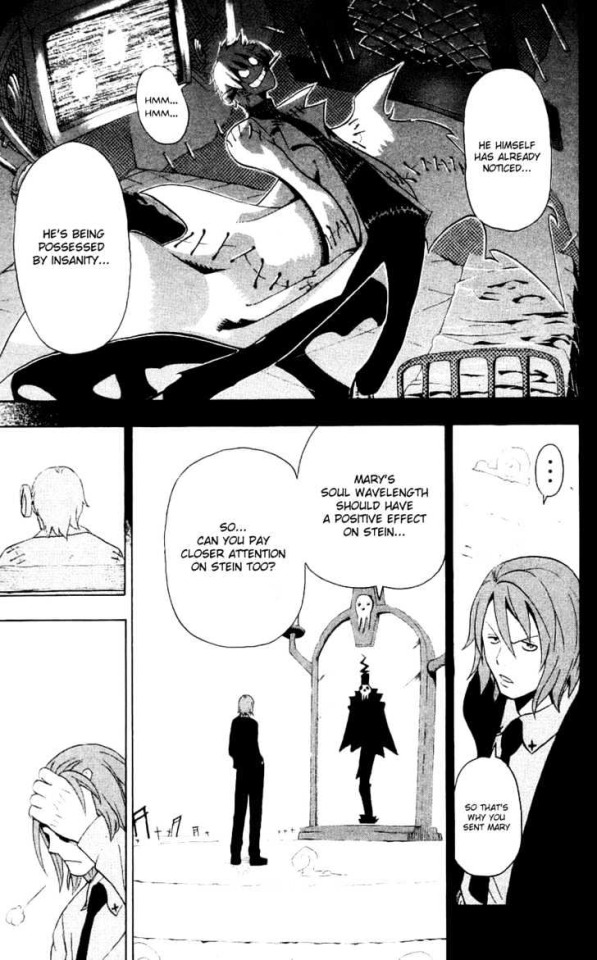
And one of the more interesting examples of this is how each incarnation handles Dr Franken Stein's descent into madness, and ultimately rejecting the abyss in it's own ways.
Both rely heavily on foils and contrasts, with the Anime using Stein's lovelife by contrasting his feelings for Marie Mjolnir with his deeply unhealthy attraction to Medusa, while the Manga uses the character of Justin Law to showcase why Stein ultimately rejected total madness.
Both have the same themes, but uses wildly different means to tell their story.

The anime's biggest difference here is that it actually has Stein fall to madness, while in the manga despite all temptations, and just how close he dances at the endge he never falls in.
This by it's very nature changes Stein's story to one of recovery, rather than temptation.
Because Anime Stein gives in, and the anime is not shy about illustrating just what a terrible choice doing so is.
The anime is also different in that it very much builds upon already established character and storylines in order to tell it's tale.
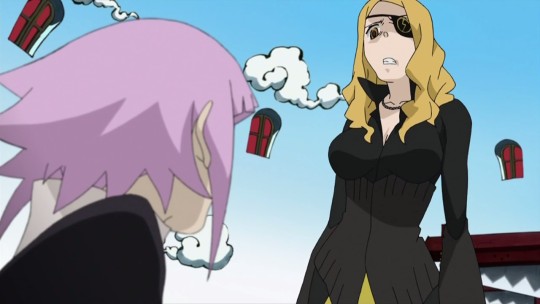
The anime takes the plotpoint of Crona betraying Stein to Medusa, and uses it as a springboard to further both Marie and Crona's characters as they deal with the aftermath of that choice.
This ultimately would likely not have happened if Crona had not fallen back into obeying Medusa again, and so Thematically, Crona's fate and redepmtion is tied to Stein's.
And while Crona is deeply, deeply regretful, Marie loves Stein and so deeply, deeply angry at both Crona and Medusa, while also wanting to reacue Stein.
However, this is just one side of the story, because Stein's actual fall is also rooted in the other character motivation that this direction uses to tell this tale.
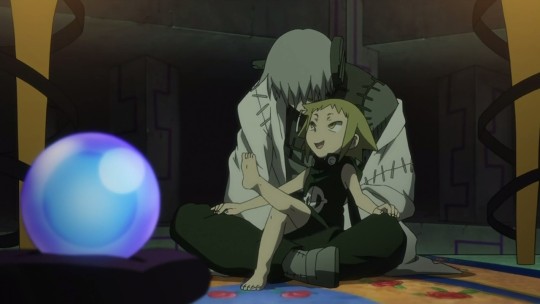
And that is Medusa and her genuine, and toxic attraction to Stein.
Stein and Medusa ultimately are very similar people, both love taking things apary, both love chaos, and both are brilliant minds.
Their attraction to each others qualities are genuine... But that is all it is. Attraction. There is no love involved here, as neither actually cares about the other as a person.
These two only compliments the other in that they bring out the absolute worst aspects about the other. It is a relationship built on perverse attraction to their love for destrution and hedonism, very much a mirrior to Maka and Crona, who ends up being very important to this section of the story.
It is also a relationship built upon being the easy road. Whereas all the healthy relationships in the series are built around having to take the hard road with your loved ones, even when it hurts, medusa represents Stein just giving in to his madness, to jump off the abyss because he sees something destructive, tempting and interesting there.
Medusa additionally takes this a step into even further depravity by adding body possession into the mix, adding a third party into this mess, one withouth any capacity for concent... Which is made even worse by the fact that the person in question is a child.
Watching medusa and how much joy she takes in having twisted Stein to her will, it is crystal clear that she not only understands just how fucked up this entire thing is, but she REVELS in it.
It is frankly one of the most disturbing things in shonen anime and manga fiction period, and though thankfully it does not go all the way to the logical and disguisting endpoint, it still leaves the viewer both disguisted, disturbed and impressed just how EVIL Medusa really is.
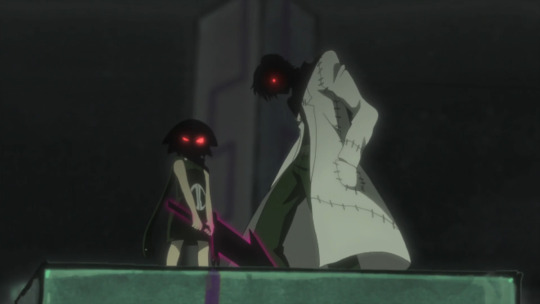
And on the opposite end of the spectrum, we have Marie Mjolnir.
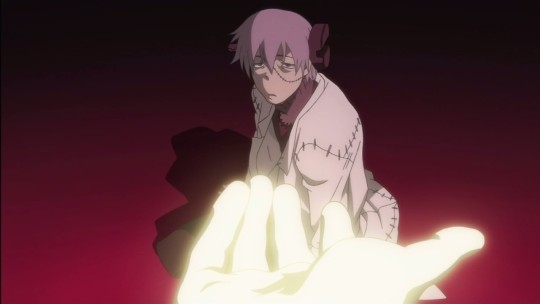
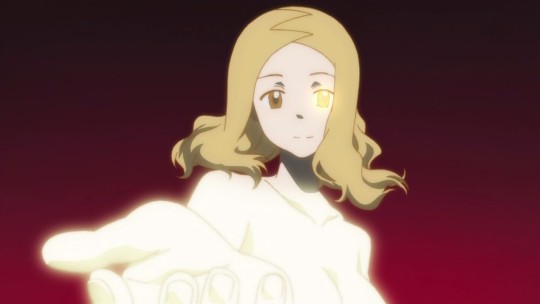
Whereas Medusa represents everything wrong about Stein's personality, Marie represents the opposite.
She represents Stein's caring side, his loyalty to his side and students, the man who was brave enough to stand alone against Medusa to buy his students time.
Hers and Stein's relationahip was one of genuine love, and understanding, not simply built on nothing but attraction and shared similarities.
Quite the the opposite, Stein and Marie could not be more different... And yet they love each other anyway.
I'll also note that the Anime portrays Marie and Stein's relationship in a different light than the manga does. In the manga, the entire point is to hammer in just how unlikely that these two people could ever fall for the other, while the Anime has the same premise but focuses on something else, namely how well this fits into Soul Eater's themes of different people coming together despite all their many, many differences.
When Stein ultimately makes the choice to go back to Marie, it doesnt feel like it's an unlikely choice, but instead one feels that it's the right one. It feels natural, that these two souls that fell away from each other once more found the other.
They are different people... But so what? They both have the bravery to gice this another shot, because they care about each other.
Also, just a bit of speculation on my part, but we never actually learn how Marie lost her eye in the phsyical world, but it shows up here, when she and Stein reaffirm their bond. That augfests to me that Marie probably lost the eye in circumstances that in some way meant something deep and profound between these two, given how important it seems to Stein.
If so, and especially if her losing it was Stein's fault in the first place, and mayhaps the reason they broke up, would add even more weight to her choice to gice this another go, forgiving him for his mistakes which deeply hurt her personally.
But again, this is total speculation.
Ultimately the Anime take on Stein is one that is defined by this contrast, the parallels and mirrors of Medusa and Marie, and Stein's ultimate choices between them.
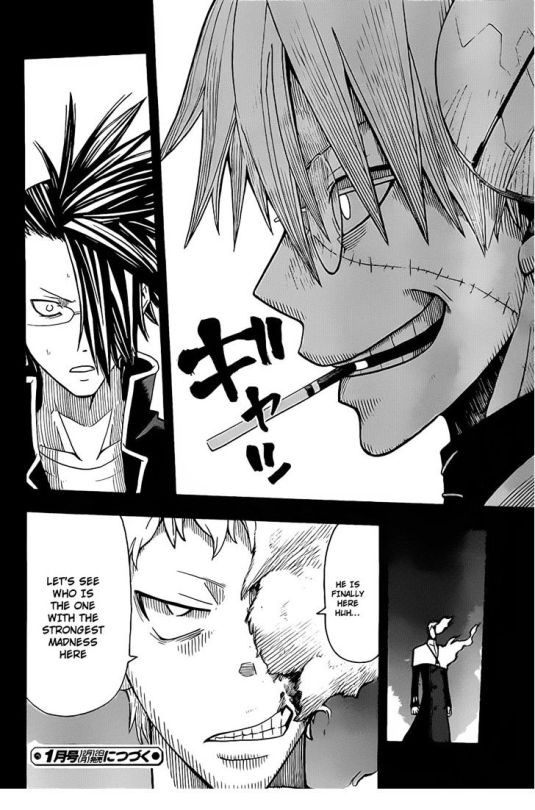
Meanwhile, the Manga's foils is not between two differen people close to Stein, but instead about Stein himself as a mirror and foil to Justin Law.
Now let me be blunt. Justin Law is a very boring villain. There is very little compelling about him directly... But there is something compelling about the contrast between him and Stein.
Justin fell to madness because despite his rigid adherence to justice, honor and being a good person, he completely, and totally rejected any and all human bonds, with the only ones he made being made by complete accident, and ultimately he, in his madness, rejected even these.
He had no one to support him or draw strength from in his time of need, and so he fell to madness.
Meanwhile, Stein, despite being far, far more naturally inclined and much closer to madness from the get go, ultimately does not jump over the edge in the Manga... And the reason for that is his relationship with Marie Mjolner.
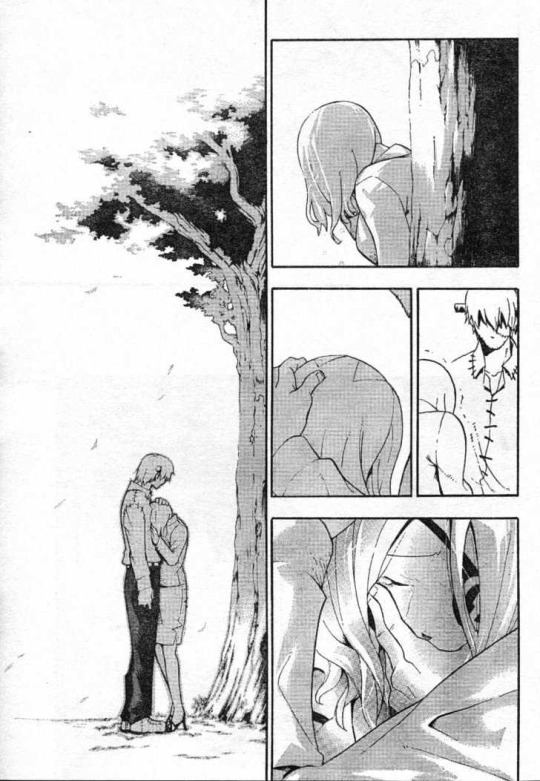
Ultimately Stein despite all his flaws devotes himself to Marie and helping her avenge her dead ex boyfriend.
And ultimately these two end up reconnecting their love just the anime, even to the degree that they get much further along in their reknit relationship than their manga counterparts.

However there are some massive differences between the two adaptions in this regard.
While the anime plays them getting back together again as a natural thing, the Manga instead plays up just how unbelievable and insane it is that these two somehow managed to reknit their relationahip, to the point where Marie actually protests that Stein is not her boyfriend, even as she is pregnant with his child.
I do actually like this take too... But I do prefer the Anime version, in large part because we actually get to see The critical turning point between Marie and stein, while the manga has their lighting the old flame happen offscreen.
It also helps that while the thematic differences between stein and Law are solid, Law is not a particularily interesting character, nor do him and Law have a deep connection.
Medusa is, and does have that connection. She is a delightfully EVIL and TWISTED villain, and her relationship with Stein makes the climax of Stain's arc, if much less of a spectacle, a much more emotional and thematically satisfying affair.
And thats even withouth factoring in the fact that this fight's outcome is actually about Crona, Maka and Medusa. Stein's fall and recovery is technically the sideplot, buy damn if it's not a great one.
#soul eater anime#soul eater#medusa gorgon#dr franken stein#meta#marie mjolnir#justin law#maka albarn#crona gorgon#old flame#toxic relationship#toxic love
218 notes
·
View notes
Text
Nene’s Dead Corpse and her ghost bf
randomly made a crap ton more sense to me
why?
fricking school (screw school I hate you (no not rly I’m just stressed))
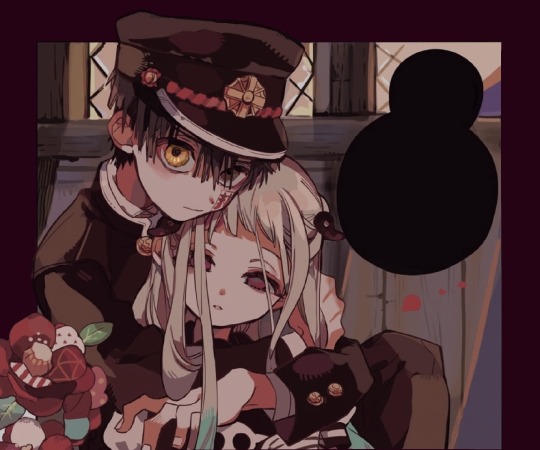
Anyway I’m a biomed class where unit 1 is studying medical investigations forensic science style
and one of the things is like, what happens to a person after the body has been dead for a while (post mortem or sum, see im learning :D)
Things like algor mortis, livor mortis, I’ve heard of. In fact I’ve even studied the clouding of the corneas before, but it never got to me till today
maybe it’s cause I cannot for the life of me study forensics without my wild imagination giving me nightmares or just panicking when I’m alone but aNyWays
I tend to imagine characters associated with death in these scenarios so I don’t lose it in class💀
*cough* Nene *cough cough*
So as I was taking notes on the slideshow, some of the images of clouded corneas reminded me strangely of something familiar, but at that point I couldn’t tell. There’s something haunting about the eyes (or maybe it’s just my over-analytical brain loving small details like this) they’re GORGEOUS
LIKE
IDK THEYRE PRETTY
Maybe it’s ‘cause the true color of the iris is completely visible in all its glory, without the pupil obscuring it
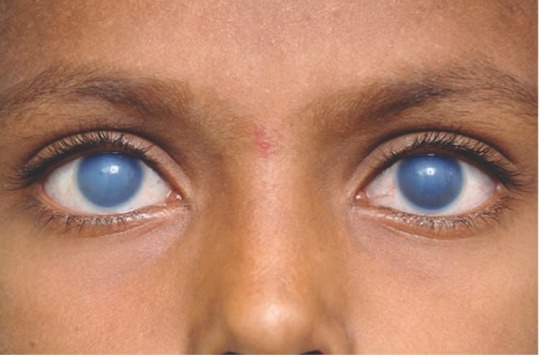
(something like this?? A little vivid tho lol)
but like
there’s no
life
no reflection, no emotion…nothing (which is so hauntingly beautiful leave me alone I’m a sucker for this now)
it’s literally just an eye with nothing but color
and then it hit me…it’s exactly the look Nene had when Mirai fast-forwarded her time
you can see in the image it’s just her plain magenta eyes with a fuzzy de-saturated blob in the center…aka clouded corneas
And that honestly made me realize that in this scene she’s not—she’s not even unconscious
No she’s literally, physiologically dead
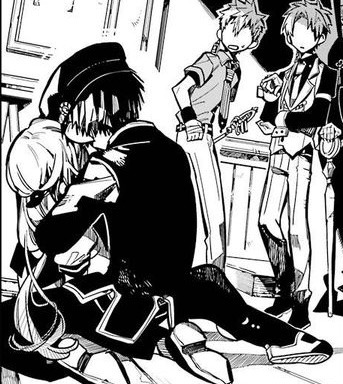
THAT IS A CORPSE HE IS HOLDING
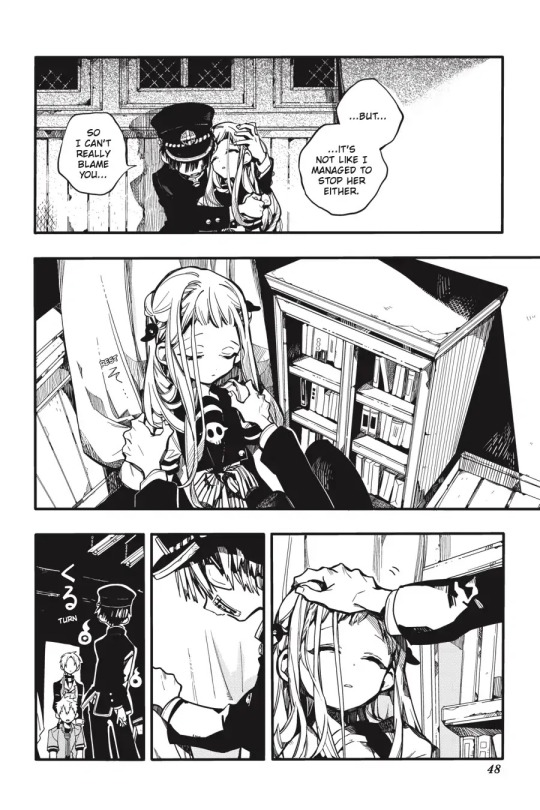
she is literally a dead body this hits me so hard😭😭
and I can imagine algor mortis kicked in by then, her body was probably cold to the touch
so imagine how he felt, and I’m aware people have analyzed his emotions but just think about it
he’s always seen her so full of life and hope, and now all he has left is an empty shell of her, cold and dead with no life left inside
…just like him
the more I think about it Hanako is just an animated corpse
he has no reflection in his eyes most of the time because he is ✨dead✨
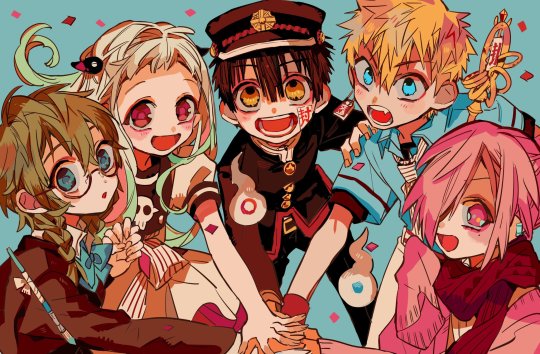
I mean Mei, Mitsuba, and Hanako don’t have a little white reflection dot like Nene and Kou
Or maybe I’m overthinking it and Nene’s eyes are just super reflective
even for someone who presumably took his own life, he probably never saw tsukasa’s body start postmortem and actually feel dead bc it looked extremely bloody ngl (I’m guessing he killed himself right after 💔)
and now he’s holding someone he cares about like this for the first time and I’ll bet that scarred him
and he figured out that never, never ever did he ever want to see his sweet assistant like this again, lifeless in his arms
and so after that, cue Hanako in his villain era who basically became a yandere the entire picture perfect lmao
and he was unbelievably adamant about it too
I mean honestly if I held anybody I knew lifeless like that I’d be scarred for life and crying for days
seeing the light drained from someone’s eyes is so interestingly sad to me
Look at the difference:
Happy
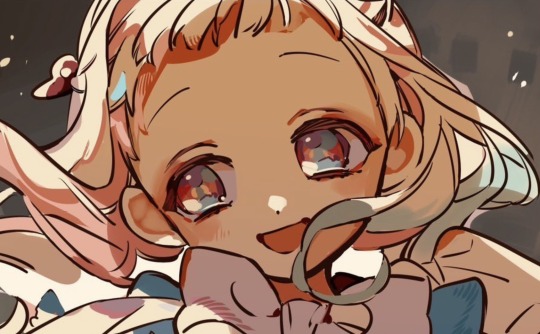
vs Sad/Determined
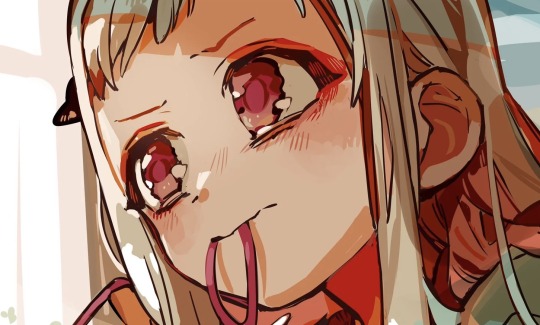
vs Depressed (ig??)
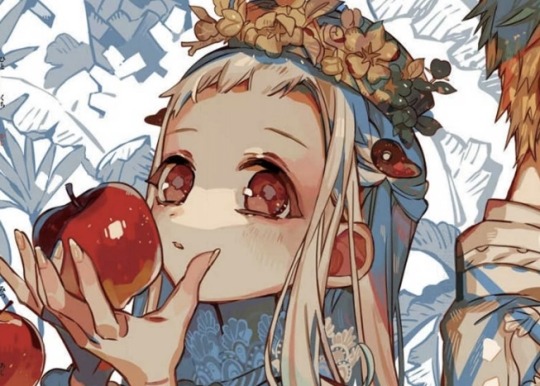
vs Dead
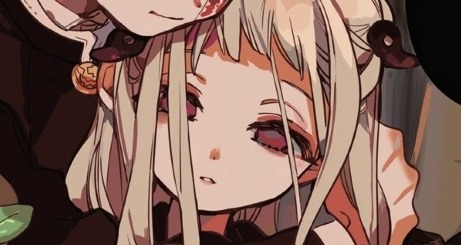
She still has so much emotion in her eyes
and then d e a d
literally looks like a porcelain doll
wait she looks so pale in the last image compared to the others now that I think about it
I love aidairo’s eye for detail it’s so fun to figure out
Well anyways thanks for coming to my Ted Talk essay atp-
IT’S PAST 1 AM AND I SHOULD BE STUDYING FOR SAID BIOMED CLASS AND HERE I AN GOING ON A TANGENT ABOUT A FICTIONAL CHARACTER’S EYES
send help
anyways excuse me while I grab a box of strawberries to munch on and cry my eyes out all over my homework before I sleep-
#hananene#tbhk#jshk#hanako kun#toilet bound hanako-kun#yashiro nene#tbhk manga spoilers#aidairo#my ramblings#my rambles#i literally have to wake up in 3 hours what am I doing#Yknow screw school Hananene is more important#i love angst#they’re so bittersweet#and beautiful
164 notes
·
View notes
Note
https://www.tumblr.com/olderthannetfic/748370073567313920/i-think-for-me-one-of-the-big-stumbling-blocks-i
People in the replies are jumping to a lot of really obnoxious conclusions about anon that really just ultimately illustrate anon’s point.
There’s all this stuff that is *assuming* anon is pro censorship when they never say anything like that (and in fact, i thought they suggested the opposite). They’re talking about how sex positivity and anti-anti attitudes get weaponized or misused in some fandom spaces to make people feel like it’s wrong for them to be squeamish and want to *personally* avoid men who are really vocal about their love of lolicon and slavery isekai, because guys who are that vocal about it have in their experience, tended to have that reflect real world attitudes.
I think it’s good to point out that plenty of people like these things privately and you’ll never know, and it’s the being super vocal about it around uninterested people that’s the red flag here. But people just assuming that anon holds every attitude they associate with some stereotypical anti, and that their message indicates some thinking to BE CAREFUL! about… really just proves their point that a lot of people have a bad tendency to only see this in terms of how things work in their particular corner of fandom, and don’t recognize how what can mean one thing in one, primarily female and queer space, doesn’t necessarily translate well to a space with a lot of entitled cis dudes. Assuming that personal discomfort with certain kinds of fiction automatically translates into being pro censorship (what) when that person said nothing else to indicate that, is one such assumption.
(Also one person was trying to suggest it was racist of anon to “single out hentai”… maybe the reason they mentioned hentai is because they’re *specifically* talking about anime fandom?!?)
Idk, it doesn’t help proshippers if we can’t see anything except via the narrow lens of pro vs anti fights on Tumblr and AO3, be able to advocate our positions. We are aware of how fandom blinders can blinker people in the opposite direction—antis who don’t recognize that rhetoric that they think is just all about shipping is also used by right wing activists to advocate banning books and drag shows—but it’s true in both directions.
Being uncomfortable with a lot of “sex positivity” rhetoric because you’ve mostly seen it used to tell you you’re wrong to be uncomfortable with dudes who are super outspoken and pushy about their porn habits is a really common experience for lefty women IME, both outside of fandom and in fandom spaces with more cis dudes. Most women I’ve met like that are vocally anti censorship, it’s about being able to take charge of their personal boundaries and not have them shamed. Proshippers pushing them away by loading more unhelpful and inaccurate judgments on them aren’t helping them and are just shrinking their movement, making it more likely it’ll be dismissed as just “very online fandom drama” (and if you’re that clueless, are they wrong, really?)
Also it’s just helpful to better understand why some people might find your enemies’ arguments more initially compelling than they should be.
--
"Sexual liberation means sex with me specifically" was a plague in the 70s from what I hear, and I'm sure it has been a thing forever.
64 notes
·
View notes
Text
A list of mutable batfam headcanons that live inside my brain:
Steph deserves to be 6’ minimum, preferably 6’1” or 2”
Bruce is constantly trying to balance his need to be at the same eye level or above the people he’s intimidating vs his need to do his funky little gargoyle crouch. His favorite thing about the GCPD roof is that it has lots of surfaces he can crouch on and still meet or look down at Gordon’s eye level
Tim and Damian suffer from “too similar to get along” disease and must either become best friends or despise each other until the end of time
Babs prefers light, natural toned makeup. Steph prefers pops of color and decent amounts of jewelry when she can get away with it. Cass prefers jewelry and no makeup at all
Jason’s comfort meals are all variations on soup served with bread for dipping
Jason is of the opinion that Fitzwilliam Darcy is an ass at the beginning of the book and it’s a good thing he decided to change himself so he could take his place as Best Fictional Man Ever. Dick, who read the book in order to be able to connect with Jason better, is of the opinion that Fitzwilliam Darcy has done nothing wrong ever and only needed to work on his social skills, meaning that it’s his improved ability to communicate that makes him worthy of Elizabeth Bennet at the end. Neither of them wants to listen to Tim’s analysis of what this says about their relationships with Bruce
Duke has never engaged in non-Alfred approved chaos. This is not because Duke seeks Alfred’s approval, but rather because their senses of humor are in perfect alignment and Alfred is always pleased to discover that he approves of Duke’s particular instances of chaos even after the fact
Damian never had stuffed animals growing up, but after being corrupted by Dick’s influence he can no longer sleep without a minimum of one in his bed
Damian collects posters and articulable action figures. His favorite ones are the ones that can stand on their own, which he uses for posing practice in his drawings. His favorite figure is of one of the characters in Cheese Vikings who has a zuko-esque backstory and a secret propensity for gardening
Dick always buys the most beat up box of cereal at the grocery store because he feels bad for them
Cass loves not only ballet, but other works by classical composers as well. She will unironically listen to the local classical station, and can identify the Borodin String Quartet by the sound of their instruments alone
Tim and Bruce watch and read Gray Ghost media in all its various forms and discuss it together as a bonding activity
Alfred and Jason’s shared birthday is usually celebrated with them making each other cakes, meaning that everyone gets to enjoy not one but two cakes for the day
Jason specializes in cheesecake above all other cakes, though he did make Damian a black forest cake for his birthday once right after he’d finished playing Portal
Literally everyone is surprised when they learn that Damian plays video games. No one has ever once looked at him and thought “yeah, i bet that kid plays console games” and he’s actually really insecure about it, but he also refuses to wear any kind of merch outside the house. He owns dozens of gaming and anime T-shirts but refuses to be seen as anything but completely neutral outside his own territory
Most of the bats wear drug-detecting nail polish at all times, though the base and reactive colors vary by the bat in question
Bruce and Dick have both had therapists straightup quit on them and are therefore reluctant to go back to therapy ever again
Duke’s favorite book is Walden Pond
Alfred read Lord of the Rings aloud to Bruce when he was a kid
#dc#batfam#batman#bruce wayne#dick grayson#alfred pennyworth#jason todd#tim drake#cass cain#stephanie brown#duke thomas#barbara gordon#headcanons#hc#nightwing#robin#red hood#red robin#spoiler#orphan#batgirl
326 notes
·
View notes
Note
🔥combiners/gestalts
My unpopular opinion here is probably that I think the best way to reconcile the difficulty in dealing with the fact it's hard to do combiners in fiction given that they are So Many Characters is to lean into how Animated did it and... reduce the number of characters needed for combiners! On the one hand, combiners are very iconically a Bunch Of Characters who become a bigger character. On the other hand, it's hard to do that justice in fiction, because now you need to characterize five characters or whatever for every combiner you have. People complained Barber made the Constructicons a functional hivemind who was one single character, but like, you see why he did it, you end up with rapidly ballooning casts. I liked that approach in that he worked to make it a part of how combiners worked (and there's truly some untapped potential in the 'willing hivemind' vs 'unwilling horror' approach IDW1 never quite realized, I think), but ultimately, I think the easiest way to make it work in fiction is to simply. Reduce how many characters are needed to make a combiner. It pains me to say, as someone with real fondness for some obscure combiner teams (technobot stans unite), but honestly. TFA making it a two-person deal made total sense when working with the fiction. Maybe making it three people would still work, even. But I do think the reasons combiner teams don't tend to make it to tie-in fiction in a dedicated way is you have so many characters, especially if you have more than one combiner, and it becomes unwieldy. Trimming them down makes sense. You can hone in then.
23 notes
·
View notes
Text
My Personal History with My Good Friend, Satan
My first encounter with The Devil - that I can remember, at least - came when I was about three or so. My mom liked to borrow VHS tapes from libraries to show me and my siblings a lot, and one of the libraries she used was the one at our church. It was a small and obviously very religion-centric collection, but it left a notable mark on me - like, that's where I saw this weird, kinda shitty cartoon version of The Lion, The Witch, and The Wardrobe which might be responsible for irreconcilably fucking up my taste in women? I just have this distinct memory of watching the scene where Edmund is tempted by the White Witch and thinking, "Yeah, he's making the right call." If anything I was frustrated that he hesitated - three year old me was already simping for this woman. Just imagine a child channeling Ernie Hudson in Ghostbusters and growling, "When a terrifying and beautiful woman offers you candy and a private sleigh ride, you say YES!" and that's basically me as a kid.
Where was I? Right, Satan. So, the other video from that library I remember was this cartoon retelling of Bible stories, and really I just remember the Adam and Eve part. The temptation scene had this huge, super gnarly-looking demonic red snake in it, and he was so cool and badass and I was already predisposed to like snakes anyway, so of course he was my instant favorite. But, like almost all media featuring reptiles that captured my little child heart, he turned out to be the bad guy - literally The Devil, in this case - and was punished at the end of the story. And that pissed me off.
Sometime shortly thereafter - or at least that's how I remember it, this was over thirty years ago so things might be smushed closer together than they really were by the fog of ages - some of the kids in my preschool chastised me for liking snakes. "Don't you know the devil is a snake? Snakes are evil!" I remembered the movie, and it made me angry.
Because snakes aren't evil, and as a kid I knew that because my parents taught me it. Snakes were just animals, they don't know right from wrong, and to call them evil it to judge them for what they are, not what they do. That experience taught me a very important lesson: The Devil is a tool to make people hate the innocent. And as I'd later learn, snakes were far from the only innocents people would vilify because of a demonic association.
The second time I met the devil came a few years later, when I was six or seven or so. My Grampa and Grams liked to take us up North to Mackinac City and the Upper Peninsula each summer, and I have a lot of fond memories of those trips, but there was one in particular that's relevant to this discussion. We saw a sign for a "laser light show" in the shopping district, and I got to stay up late to see it with my family. The show in question was basically a cartoon projected into the night sky adapting the song The Devil Went Down to Georgia. It was super primitive and hokey and cornball and terrible and I loved every second of it. I was enchanted, absolutely delighted with the spectacle and the silly song where the devil was less a force of evil and more a comically bumbling inept supervillain - one of my favorite archetypes, even back then. So that's the second lesson about the devil I learned: The Devil can be fun sometimes.
Now, Godzilla, one of the few reptile characters I encountered as a kid who didn't end up a villain (at least not in the first movie of his I saw, Godzilla vs. Megalon), had already set me on the path to loving monsters of all stripes and, by extension, horror fiction in general, so as I grew up I had many more encounters with the devil. But while I warmed up quickly to most monster archetypes, like vampires, zombies, werewolves, etc., I always felt dismissive of demons. It kind of coincided with me becoming disillusioned with Christianity as a whole, in fact. A story about fighting evil, Christian-style demons is ultimately an allegory for fighting evil as defined by Christianity, and Christianity's definition of what evil is, well, sucks. It's bad! They got some things right, but some things horribly wrong. The devil is the tool Christianity uses to make you hate the innocent, and I struggled to enjoy a lot of demon stories because of that. Still do with some, in fact.
There were exceptions, of course - I loved The Evil Dead series as soon as I saw it at too-early-of-an-age, but then, the demons in it aren't super Christian. They aren't repelled by holy water or crucifixes or prayer, and in fact God and Jesus barely get mentioned in the series and never come up as a potential solution. They're kind of secular as demons go, and maybe that made them easier to stomach. But overall, demons ranked pretty low in the hierarchy of monsters to me - they were too tainted by the religion that spawned them for me to enjoy.
Until college, anyway. I quietly renounced my faith during my Freshmen year, and then, as if seeking one last chance at redemption in my eyes, the devil came to me again the following year. That's when I had a class on Medieval literature, and was exposed to far older devil stories than I had ever seen before. And Medieval devils kick ass. They have so much more personality and variety than I had come to expect, and some are downright affable, even sympathetic to a degree. It was one of many moments in college when I realized there was much more to a topic I'd previously written off as boring and trite.
This is when I read Dante's The Divine Comedy and Milton's Paradise Lost and Marlowe's Faust and Ben Johnson's The Devil Is An Ass. It's when I read early Gothic Horror novels like Matthew Gregory Lewis's The Monk, and dived into The Twilight Zone, which has more than a few episodes that are updates of medieval-style devil folktales in a more modern (i.e. 1960's) setting. And so many of these works presented the Devil not as a stand-in for everything Christianity hates, but as a person - a deeply flawed person, yes, but a person with actual wants and feelings and thoughts of his own, a person who was interesting and compelling - and sometimes funny, and sometimes charming, and sometimes really sad. There was, dare I say... sympathy for the devil growing in my heart.
In the last year of my undergraduate studies, I attended my college's yearly Medieval Studies Congress, where people from all over the world came to Kalamazoo just to share their research papers on medieval history and literature. One girl's thesis paper was on the subject of "rueful devils," i.e. depictions of demons in literature where they wanted to repent their sins and redeem themselves, which uniformly ended with the devils' hopes being dashed as they could not fully repent. This idea... possessed me. The idea that the devil could repent, or at least try to - that there could be hope even in the most debauched sinner. It was such a good narrative trope in my eyes - why did it die out centuries ago?
Well, because the church didn't like it, you see. If the devil can repent - if the Absolute King of Evil can choose to become a good person - then he's not very useful as a tool to make people hate the innocent anymore. The devil MUST be "pure evil" to work as intended. A rueful devil, a repentant devil, a devil that can be redeemed, forces us to be more forgiving and kind. It forces us to be better. It prevents us from hating people because an old book says so. And some people just couldn't have that, and so the trope died.
...
After I got my bachelor's degree, I entered the job market and, after applying to fifty different places or so, was finally hired as a high school english teacher about two weeks before the school year started. Said school year was the worst year of my life. Like, I've had extreme self loathing issues and suicidal ideation since, like, sixth grade, but holy shit it was NEVER as bad as it was in that nine month stretch between 2012 and 2013. There was this bridge I had to cross on the way to work each morning, and about two months in the job was so stressful that part of my morning routine was thinking, "You know, if I just swerve to the right, this can all be over and I'll never have to worry again." About halfway in I began drastically losing weight despite not changing my diet or getting more exercise and it was so traumatic that to this day whenever my weight starts to drop my initial reaction is dread rather than excitement. I impulse bought the first two Kung-Fu Panda movies and, after watching each for the first time and crying hideously, proceeded to watch them on repeat for an entire weekend while sobbing myself hoarse for reasons I couldn't comprehend at the time.
I was in Hell. And the devil met me there.
I started writing a story during that year. I didn't get very far, just a couple chapters, but it was one of the few things that gave me a sense of accomplishment. Despite all the stress and sadness and misery, I made something. It was a story about demons, and Hell, and trying to make your life better even when the world around you seems deadset on making you suffer as much as possible.
When my bosses called me into their office at the end of that year and told me that I had to quit my job so the assistant principal could take my teaching position and survive the downsizing they'd get next year, and that if I didn't quit they'd give me the lowest teacher evaluation they could and make it supremely difficult for me to get hired elsewhere... I was relieved. I'd been let out of Hell. After a handful of months left to finish out the year, I was free.
And then I went home, with nothing. No job, no desire to pursue the career for which I'd spent five years and an ungodly amount of money getting a degree to pursue, no nest egg, nothing. Nothing except a few chapters of a book.
The years that followed were hard. I did a lot of temp work, it took me a very long time to find something that worked for me. I may have left the worst year of my life, but there was still a lot of misery waiting for me. And through it all, I felt the need to accomplish... something, ANYTHING. I had to make something to prove I had a reason to exist, even if it was something that only had value to me.
With three years of work, those chapters became my first novel, No Sympathies: A Tale of Those Who Trespass Against Us. It was about the devil, and Hell, and finding salvation even when things seem inescapably bleak. It was my first novel, and now, eight years later, it's the first of five.
The devil saved my life. He saw me at my lowest, lifted me up, whispered, "It'll be ok. You have to keep going. I'll be with you, but you have to keep going," and goddammit, he kept me from swerving right.
That's when I learned the greatest truth about the devil, at least to me. The devil is a tool to make people hate the innocent, yes, this is true, but because of that, the devil can be a savior for the broken, the beaten, and the damned. You can feel like you're worthless, wretched, and doomed. But if the devil can rise from Hell, if the devil can choose to change, if people are willing to pray for the one sinner who needs it most - then there's hope for you too, isn't there?
Demons are creatures of rebellion - against God, against nature, against the powers that be, against doom and damnation itself. They were made to be a tool to hurt the innocent, but that's not what they have to be. Devils can lift us up, because no matter how far you fall, no one can say whether it's the end for you except you.
...I would like to point out that I am being figurative here. The devil does not literally exist, at least not in my view of things. He's a fictional character, nothing more. But he's a prolific fictional character, and how we portray him can say so much about us. And, to me, he is a dear friend, despite being imaginary, because the devil was there for me when I was low, and it was on his wings that I rose from doom.
...again, figuratively, not literally.
77 notes
·
View notes